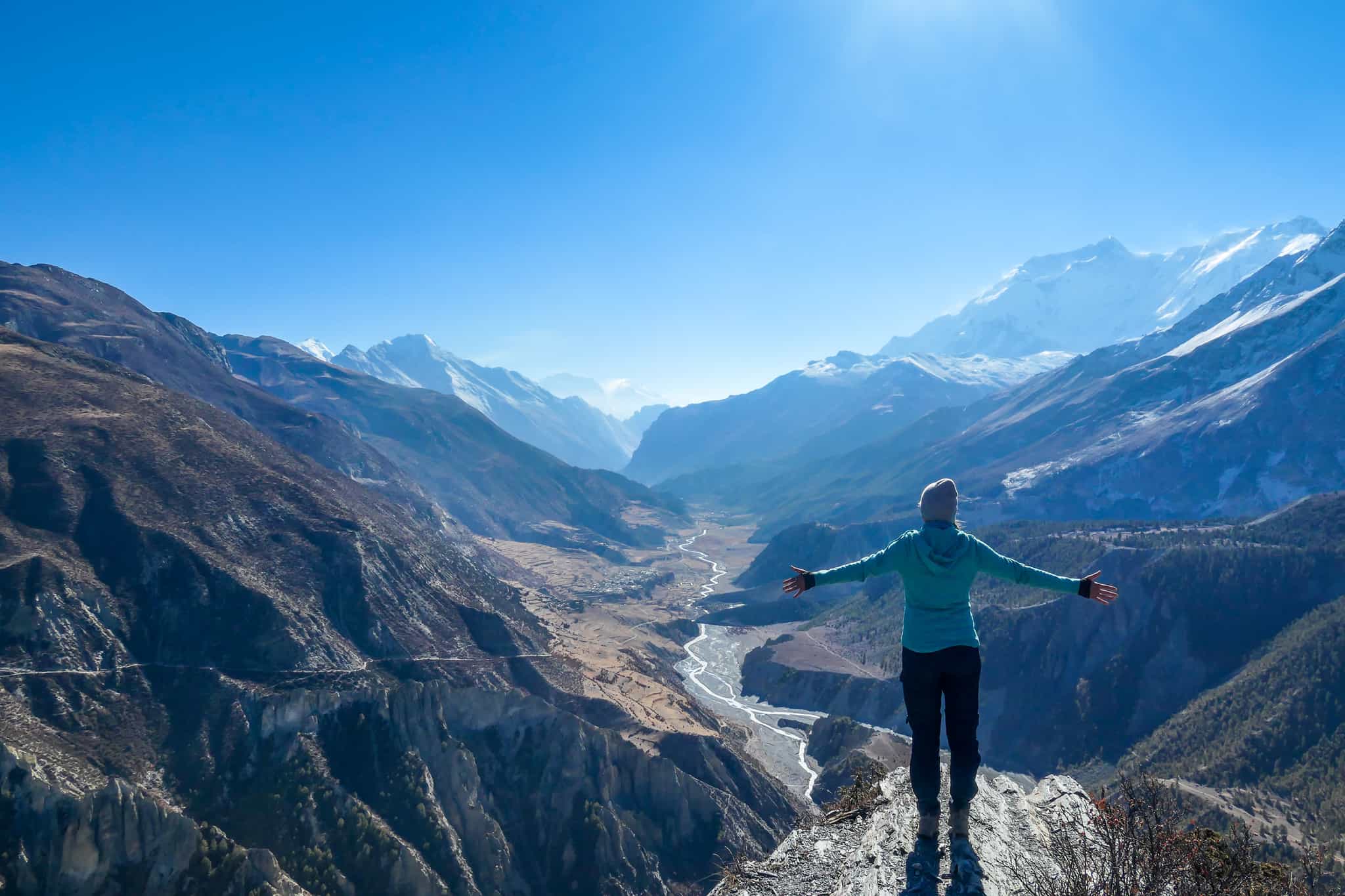
Trek the Annapurna Circuit
High-altitude trails, epic scenery and the highest navigable pass on the planet – this is bucket list stuff in the making
What's Included?
Activities & Certified Guides
All itinerary activities with local, expert, English-speaking guidesAll accommodation
4 nights in hotels or guesthouses; 12 nights in teahousesMeals
3 breakfasts and 2 dinners are includedInternal flights
Flights between Jomson and PokharaTransfers & Permits
Airport and local transfers, porters to transport your luggage, entrance fees and permitsSmall Like-minded Groups
Solo-friendly by design, join our small n’ sociable groups of up to 12 like-minded, active and outdoorsy people…
What's it like?












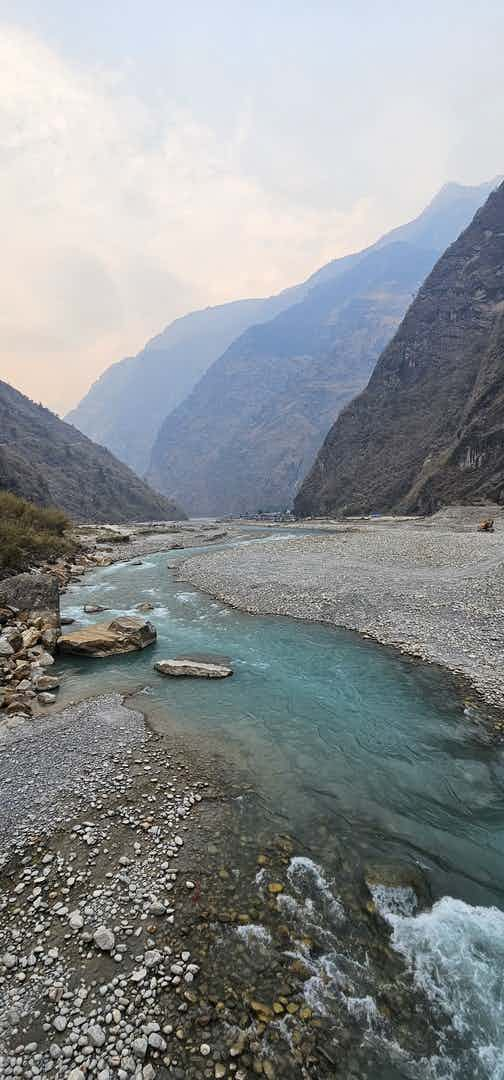
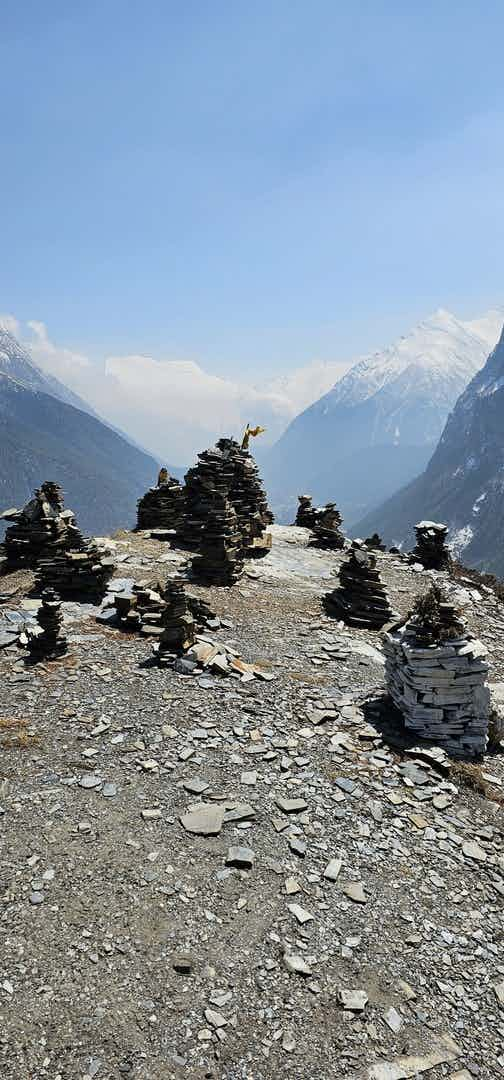
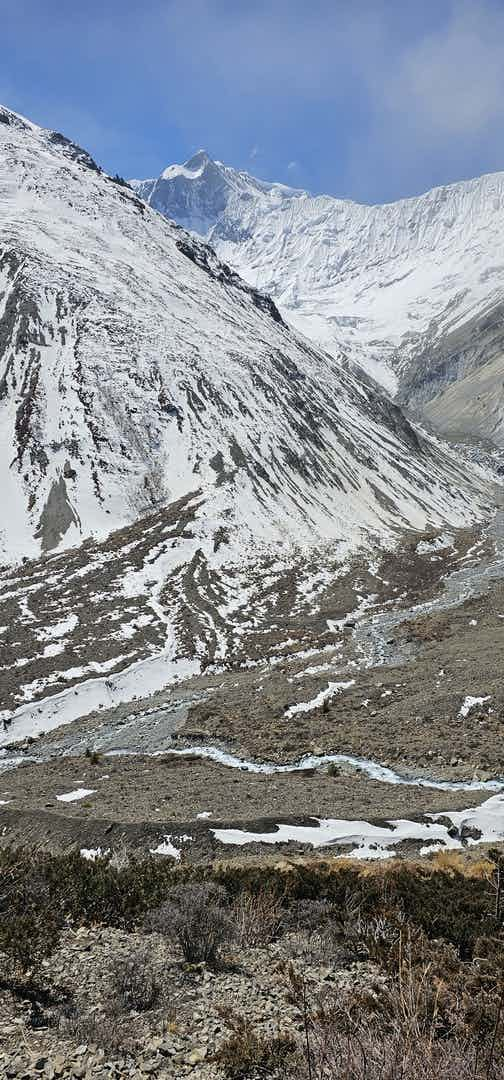
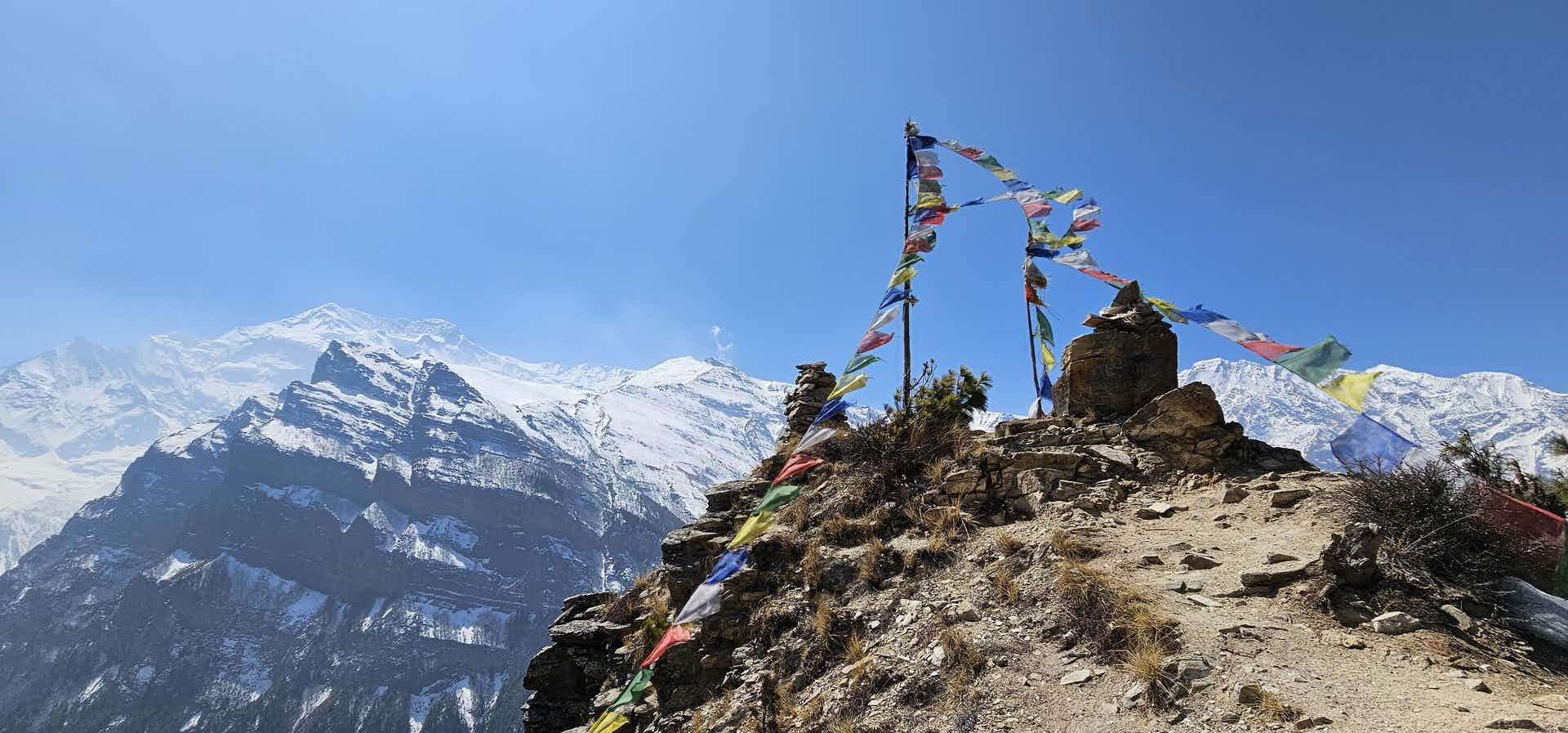
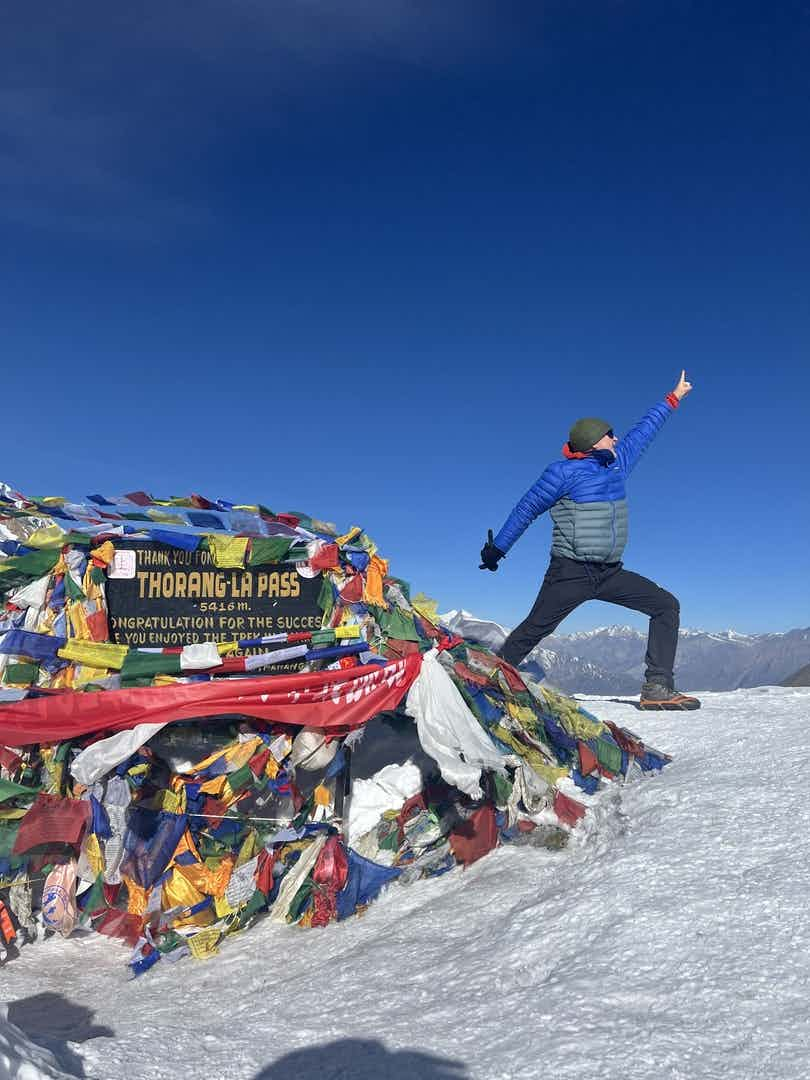
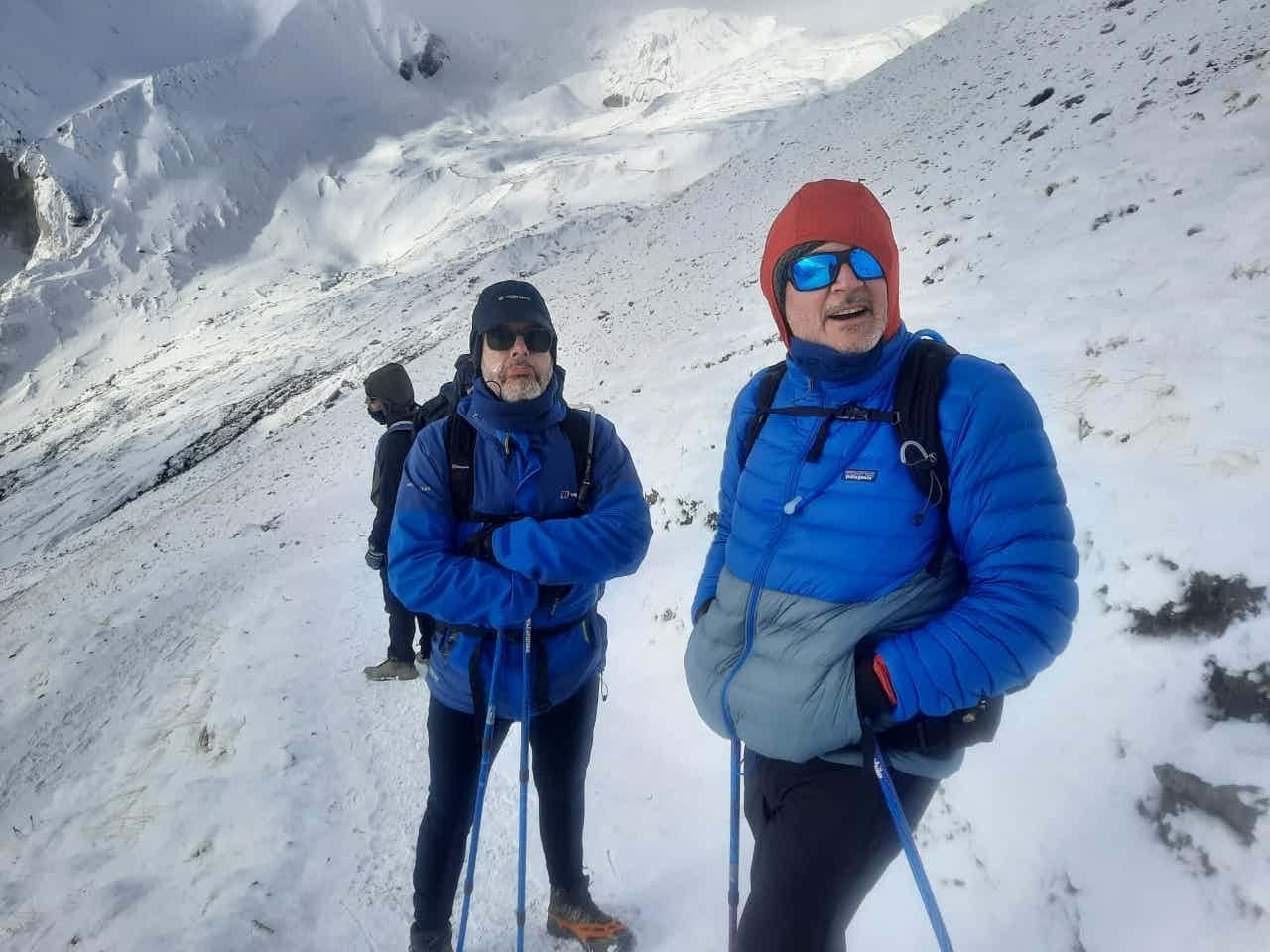
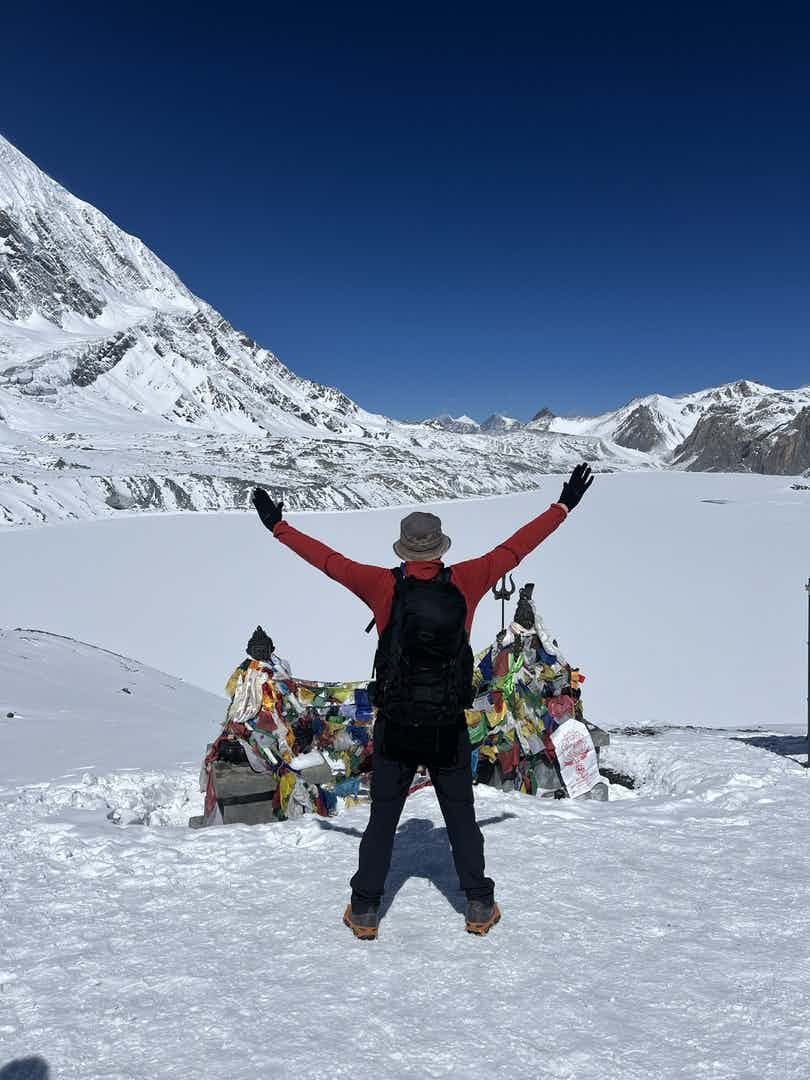
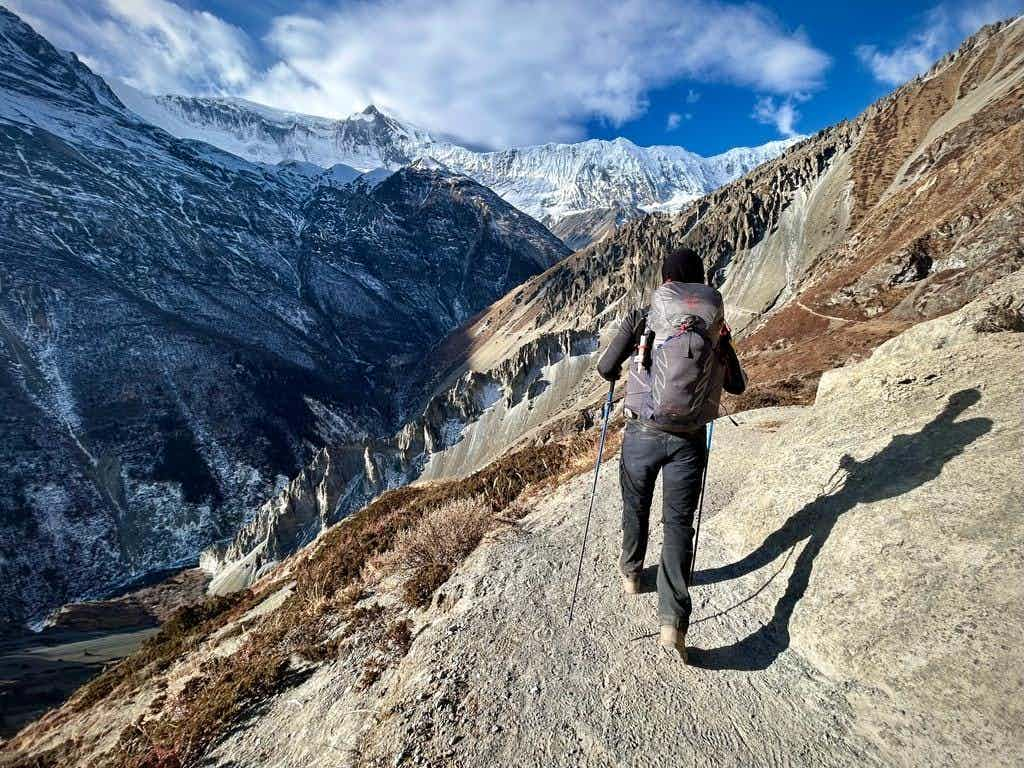
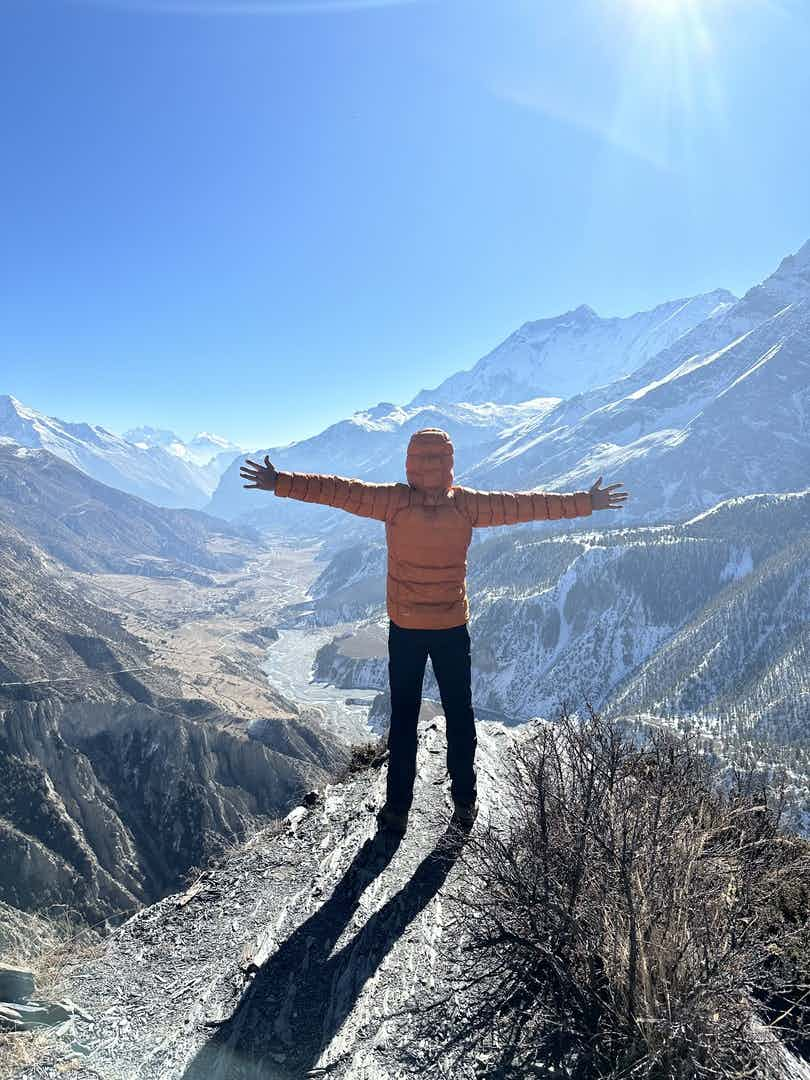
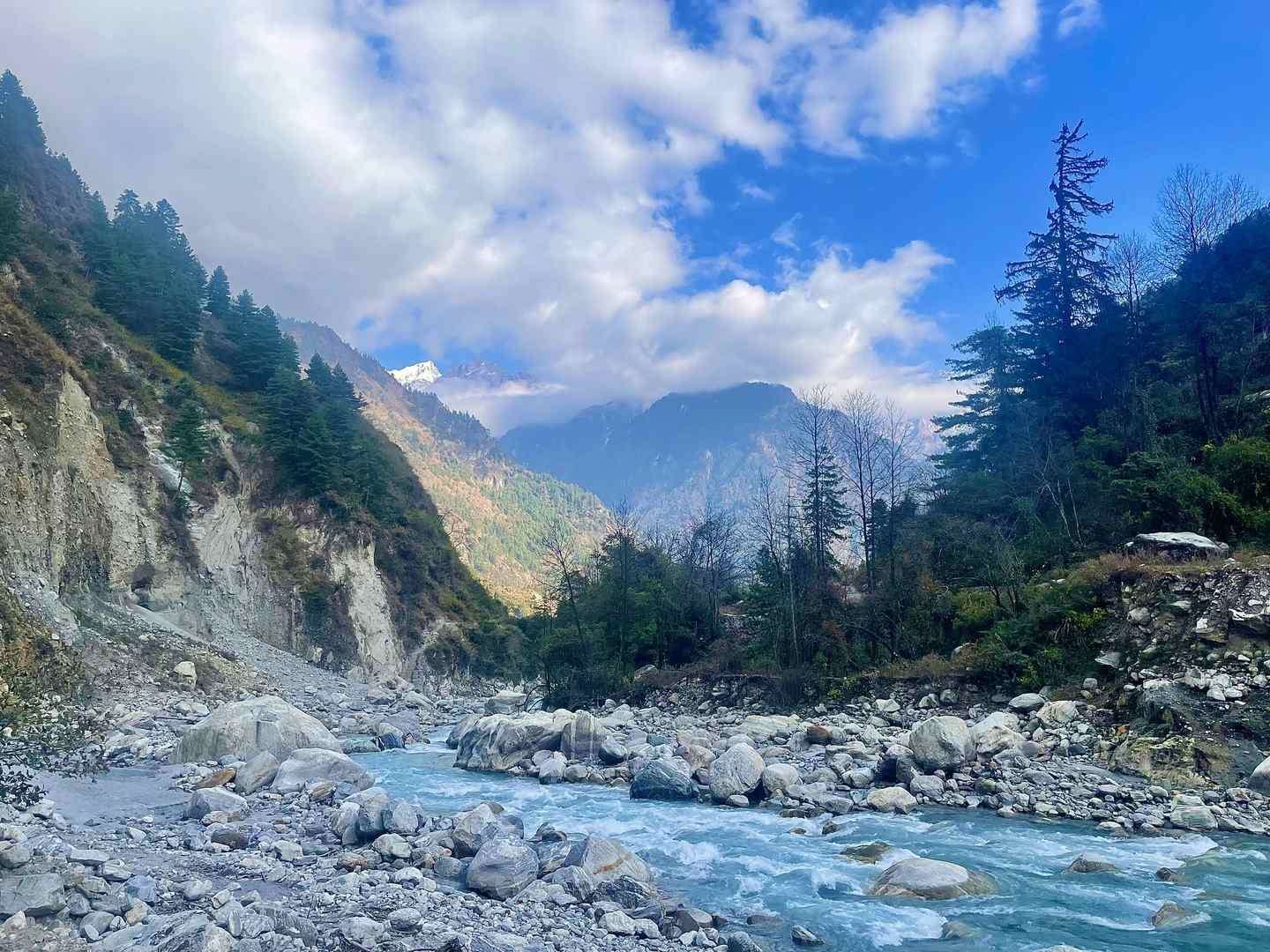
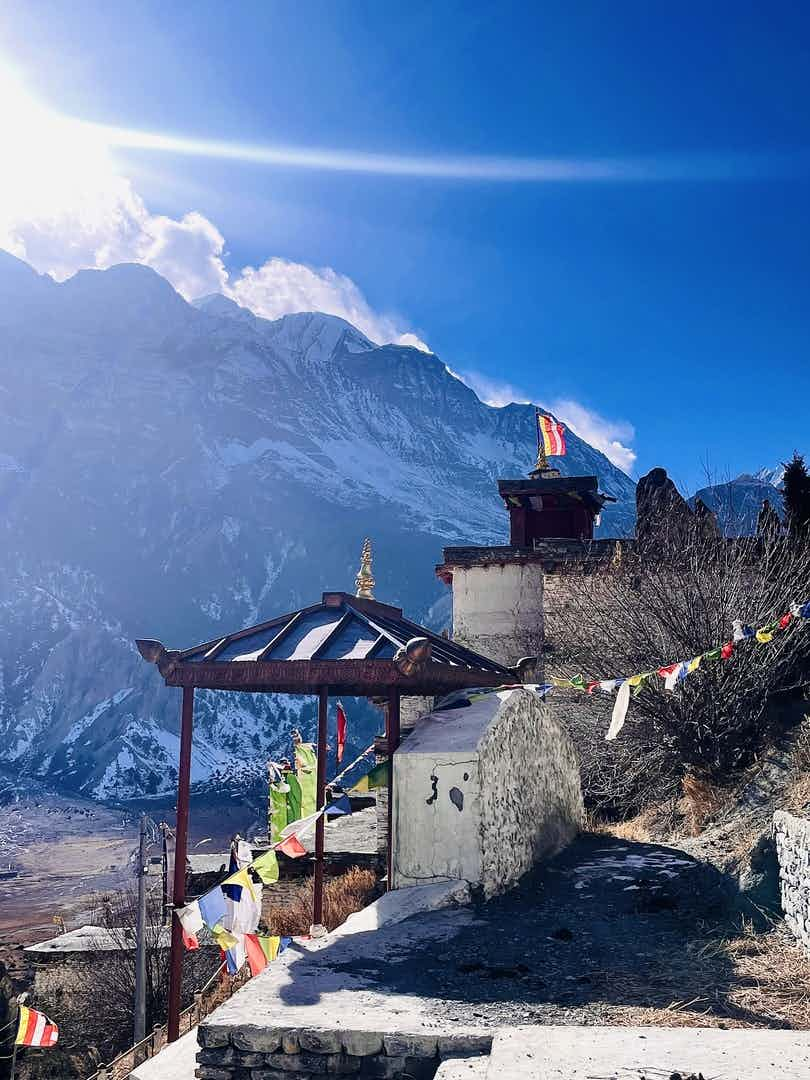
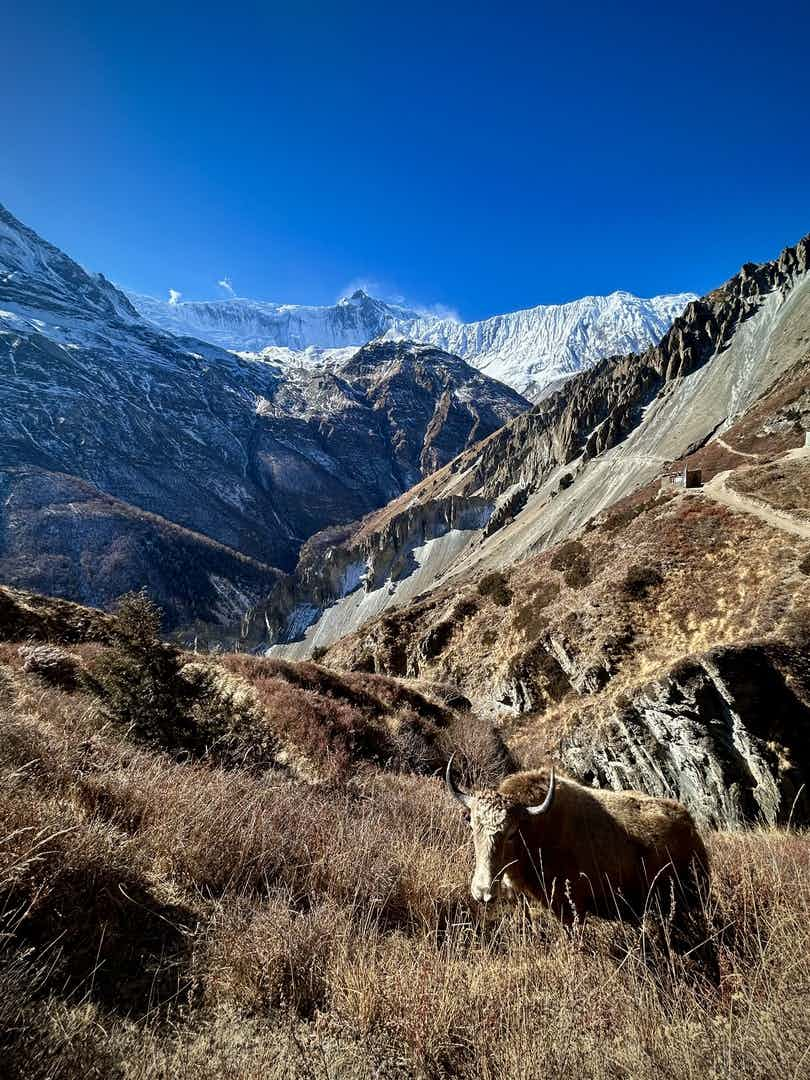

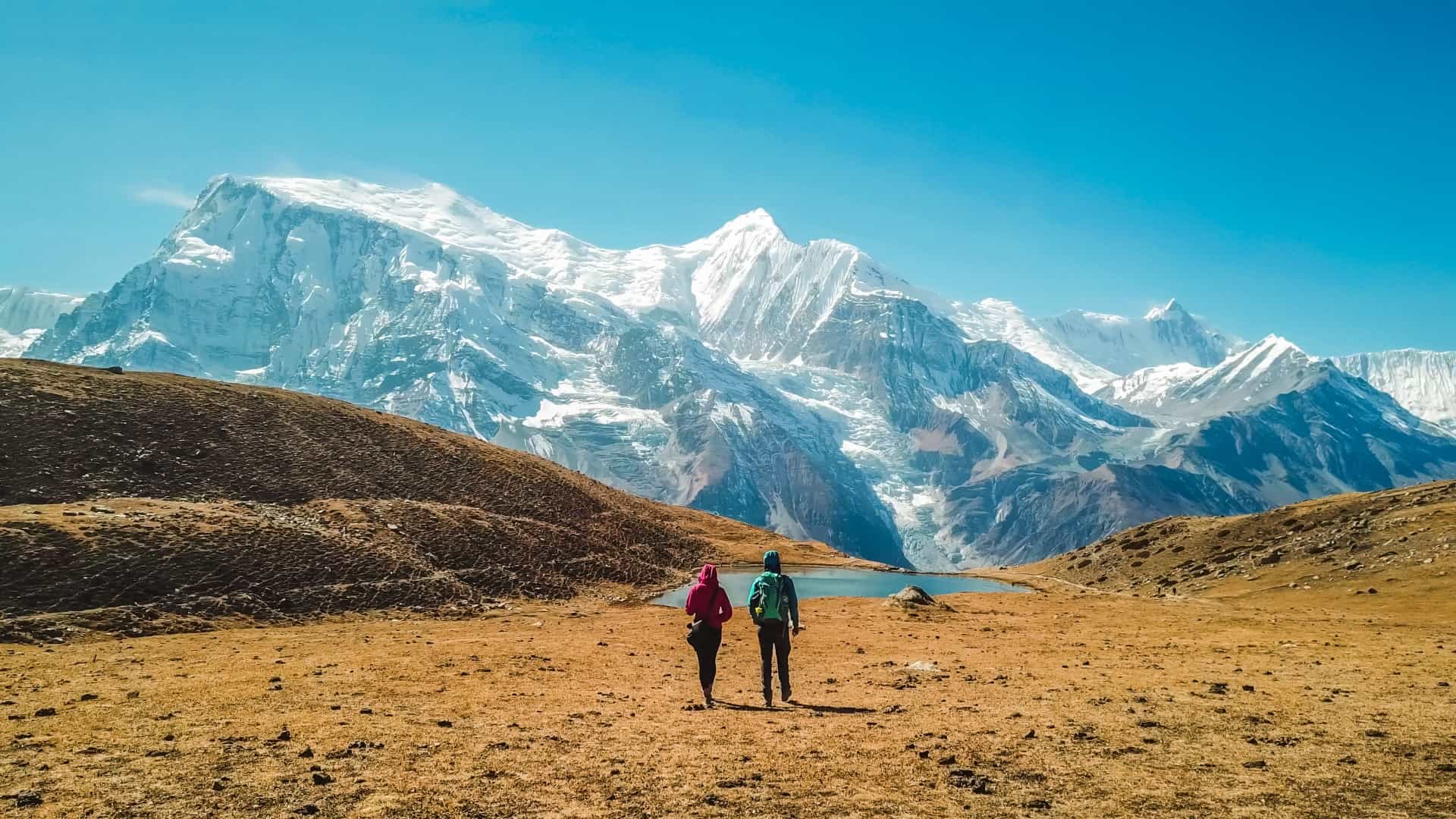
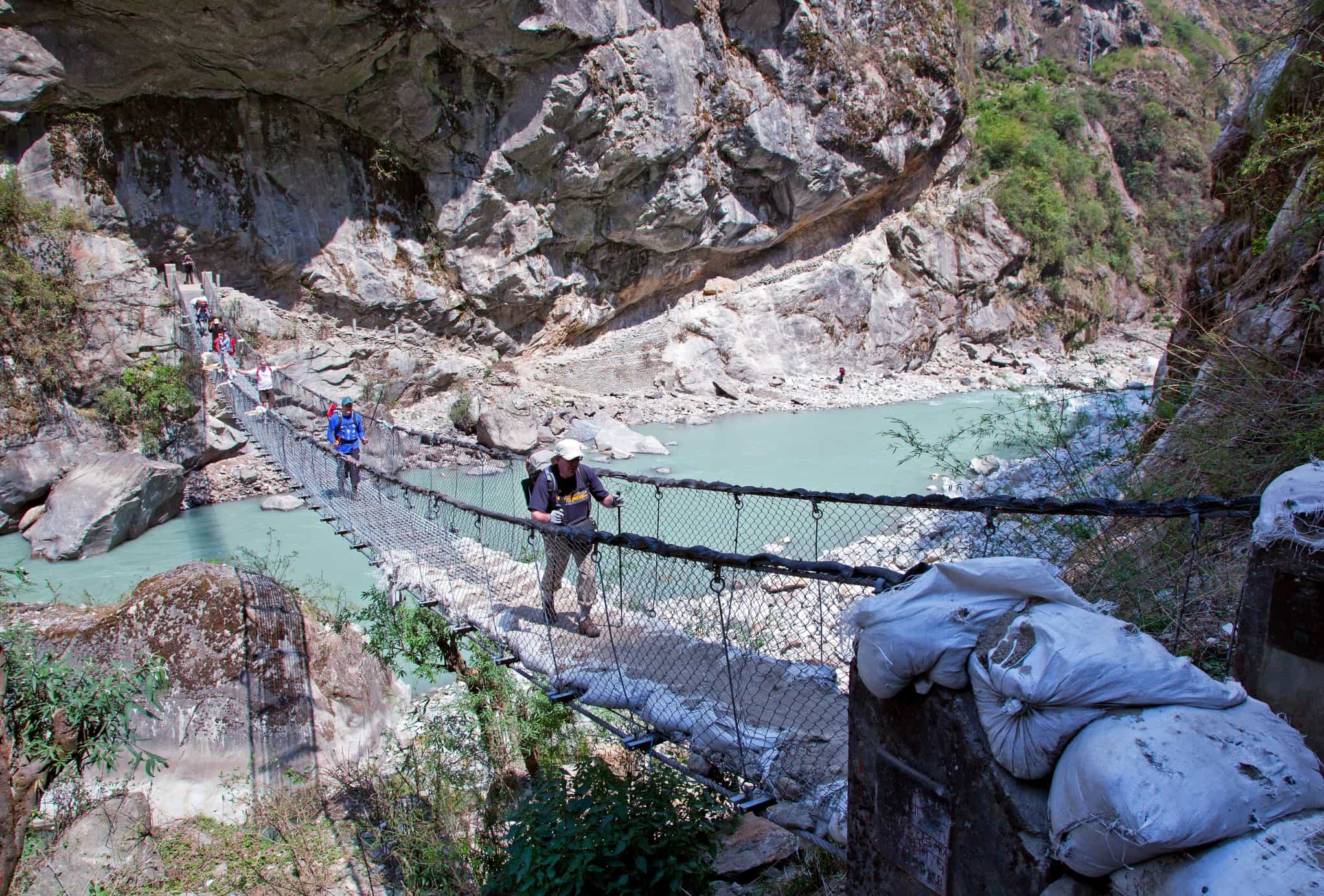

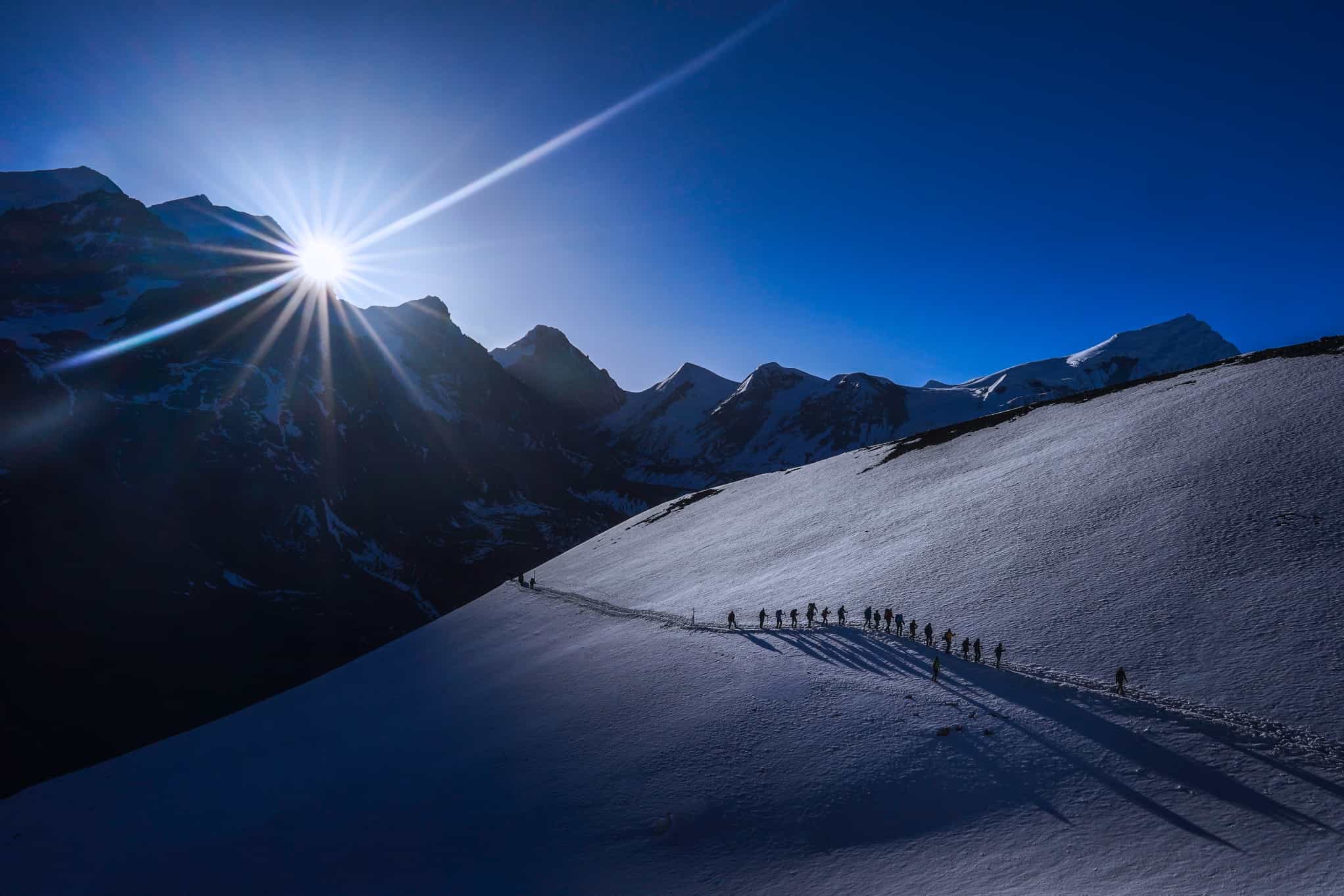
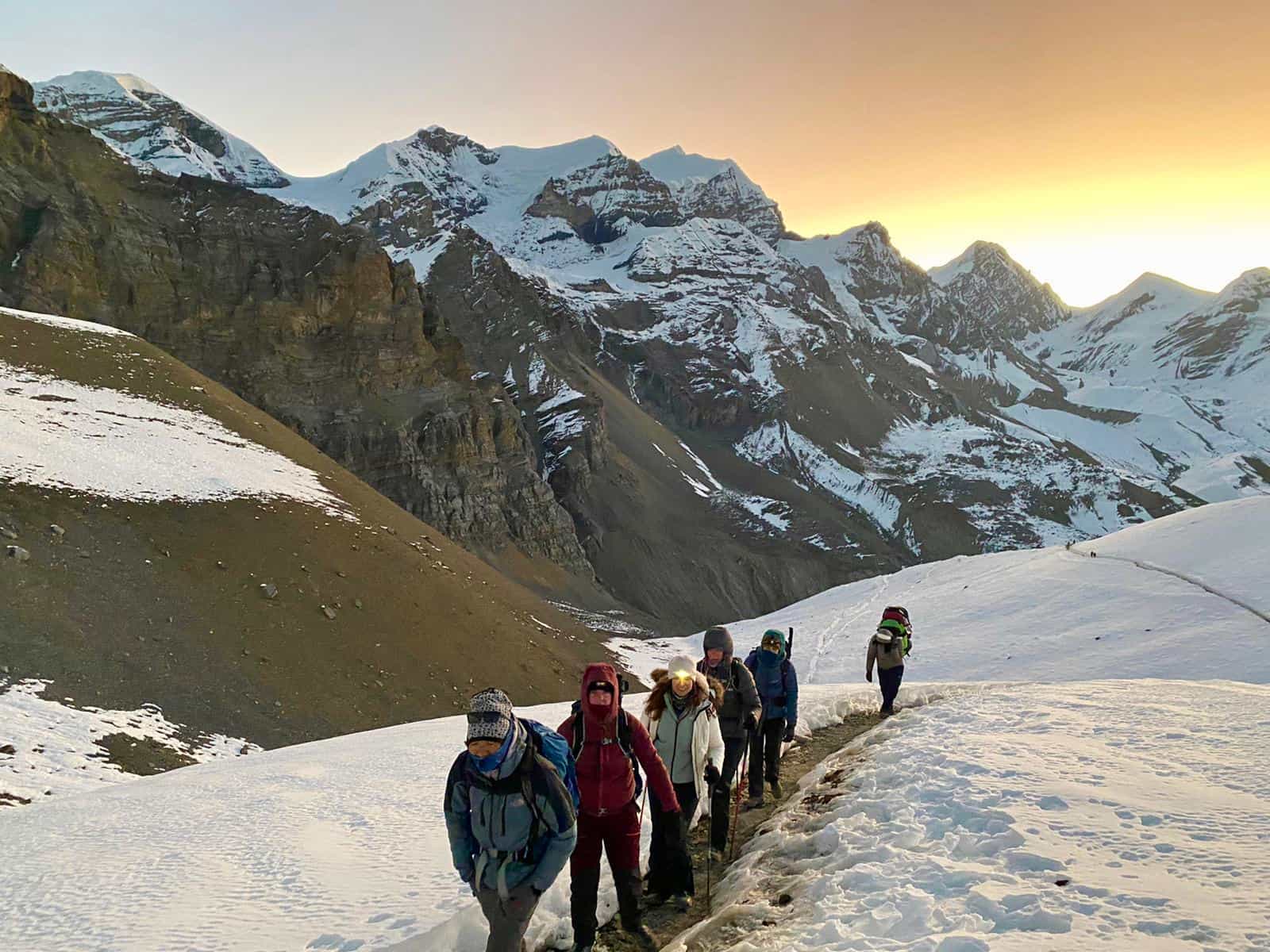
Explore one of the most incredible trekking routes in the Himalayas – 145km of devastatingly beautiful mountains
Cross through the thrilling Thorong La Pass (5416m), the highest point of the Annapurna Circuit Trek
Enter Kali Gandaki, the deepest gorge in the world – a whopping three times deeper than the Grand Canyon
Key Information
Day 1
Kathmandu awaits
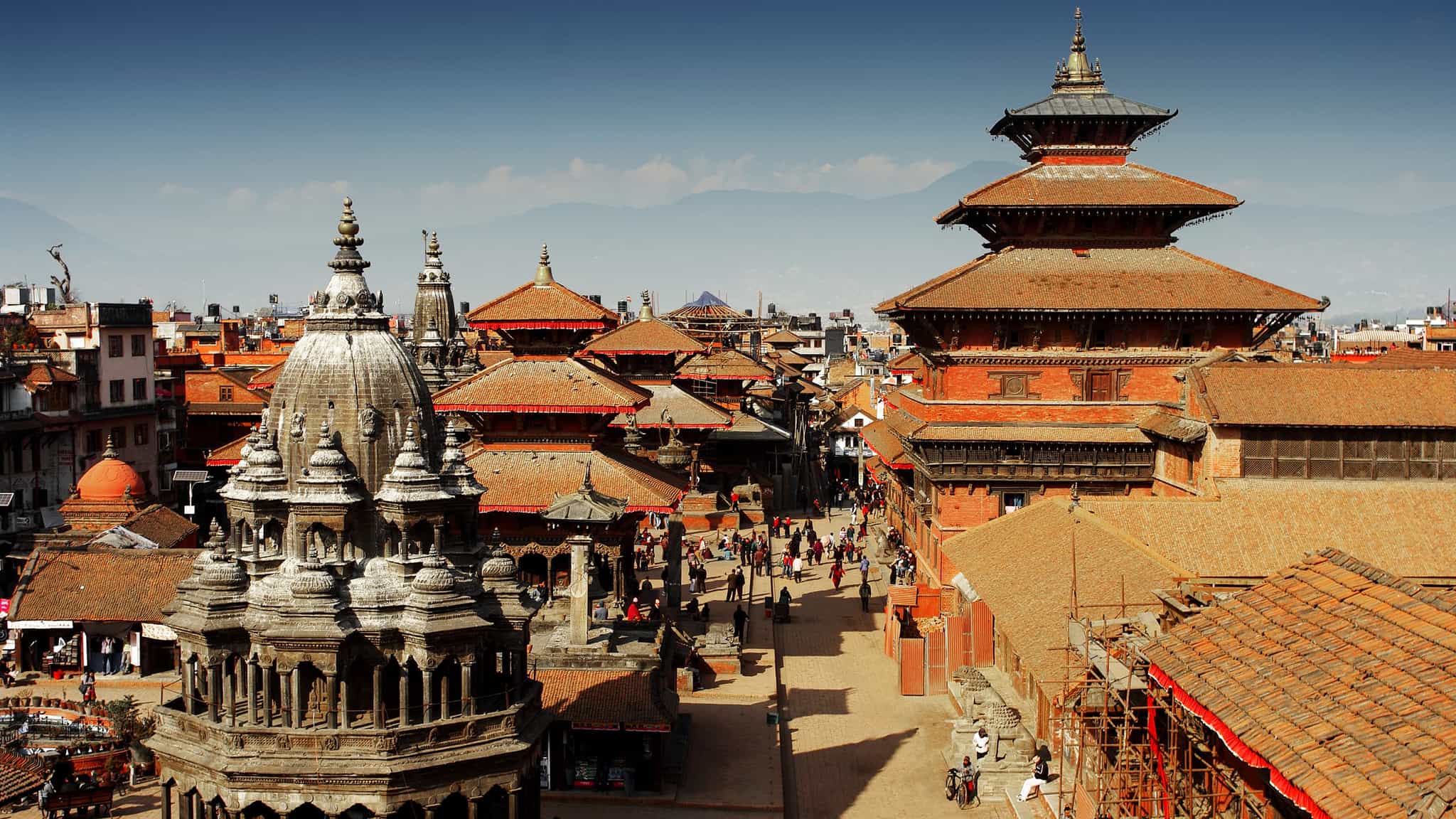
Check into your guesthouse in Thamel – heart of the sensory overload that is Kathmandu. Join a pre-departure meeting with your guides to run through the plans for the Annapurna Circuit Trek and then finish the day with a group dinner alongside the rest of your team.
Day 2
The road to Tal
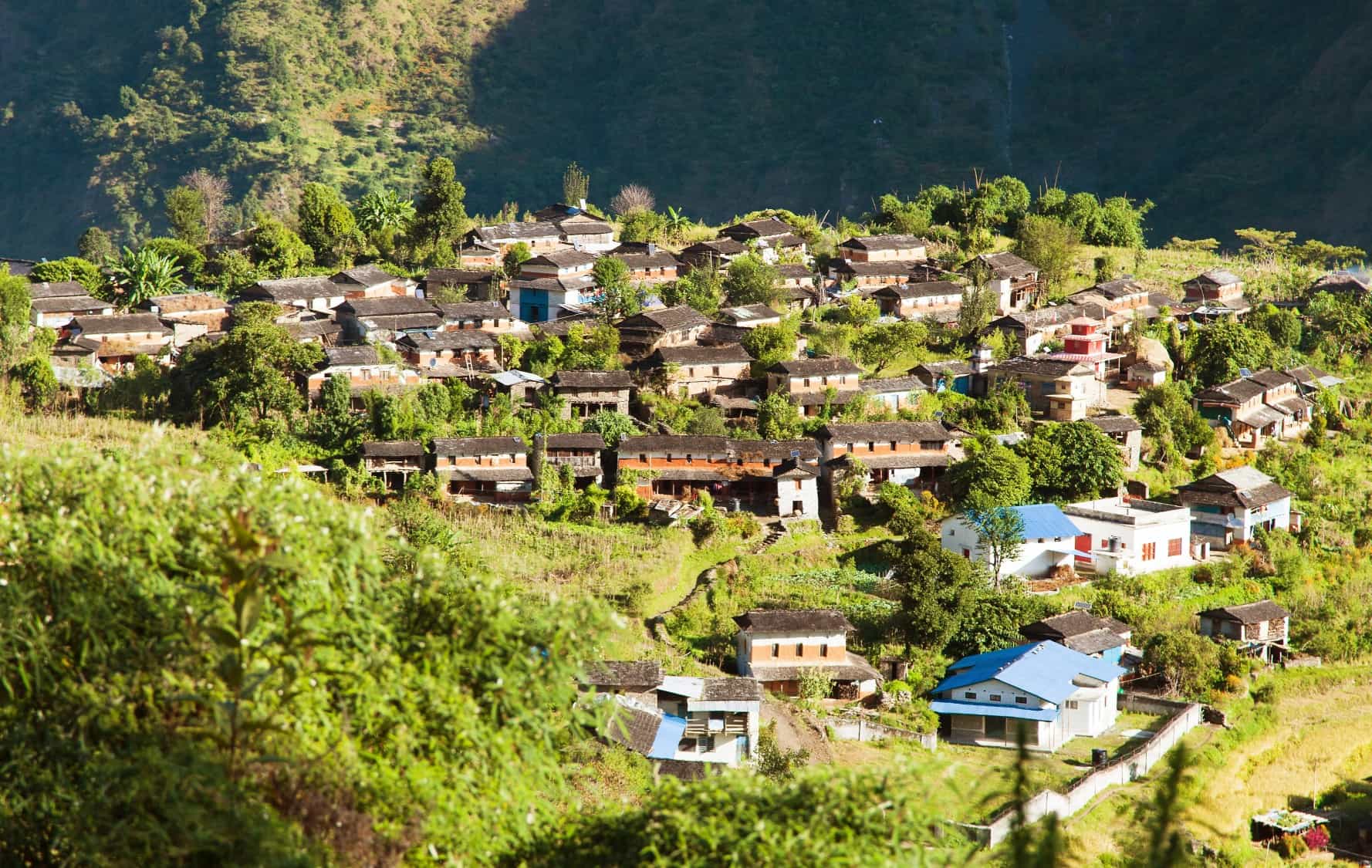
Driving
This morning you'll start the long journey to Besisahar, driving through lush river valleys, stunning Himalayan scenery and terraced farmland. Stop for lunch, then swap to a local jeep and continue on to the remote village of Tal, the starting point of your trek. Cross beautiful, rugged terrain with steep ravines, streams, waterfalls and a bunch of tea houses, then check into a local guesthouse and rest ahead of the epic adventure starting tomorrow.
Day 3
First steps on the circuit
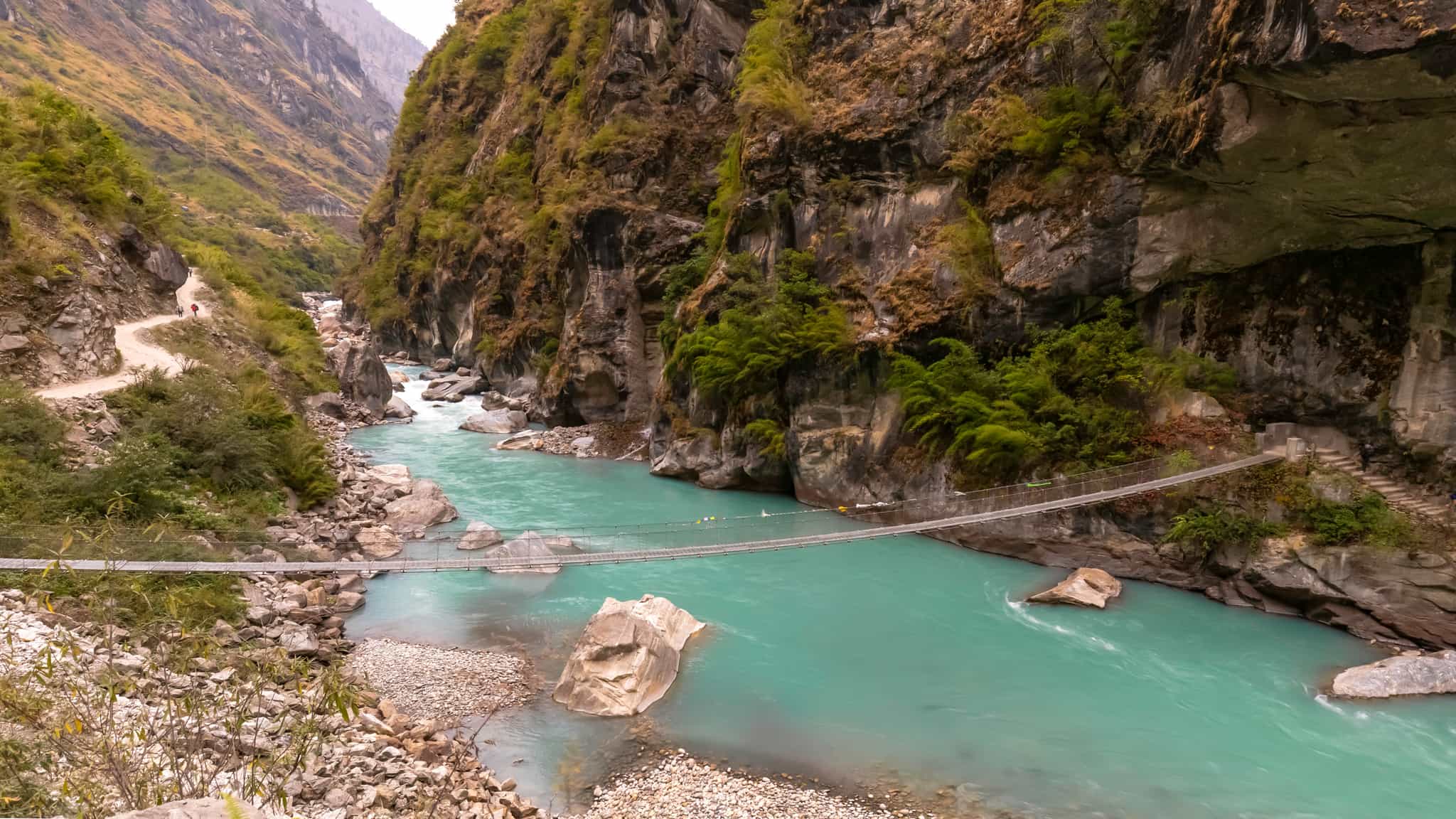
Hiking
Follow a rough track out of town and along the Marshyangdi River. Walk through the narrow valley, following the jeep track which passes through the village of Dharapani, where your permits will be checked. Continue hiking through the forest, gaining altitude gradually, then cross into the insanely beautiful Bagarchap Valley and spend the night in your first traditional Himalayan teahouse at 2160m.
Day 4
Bagarchap to Chame
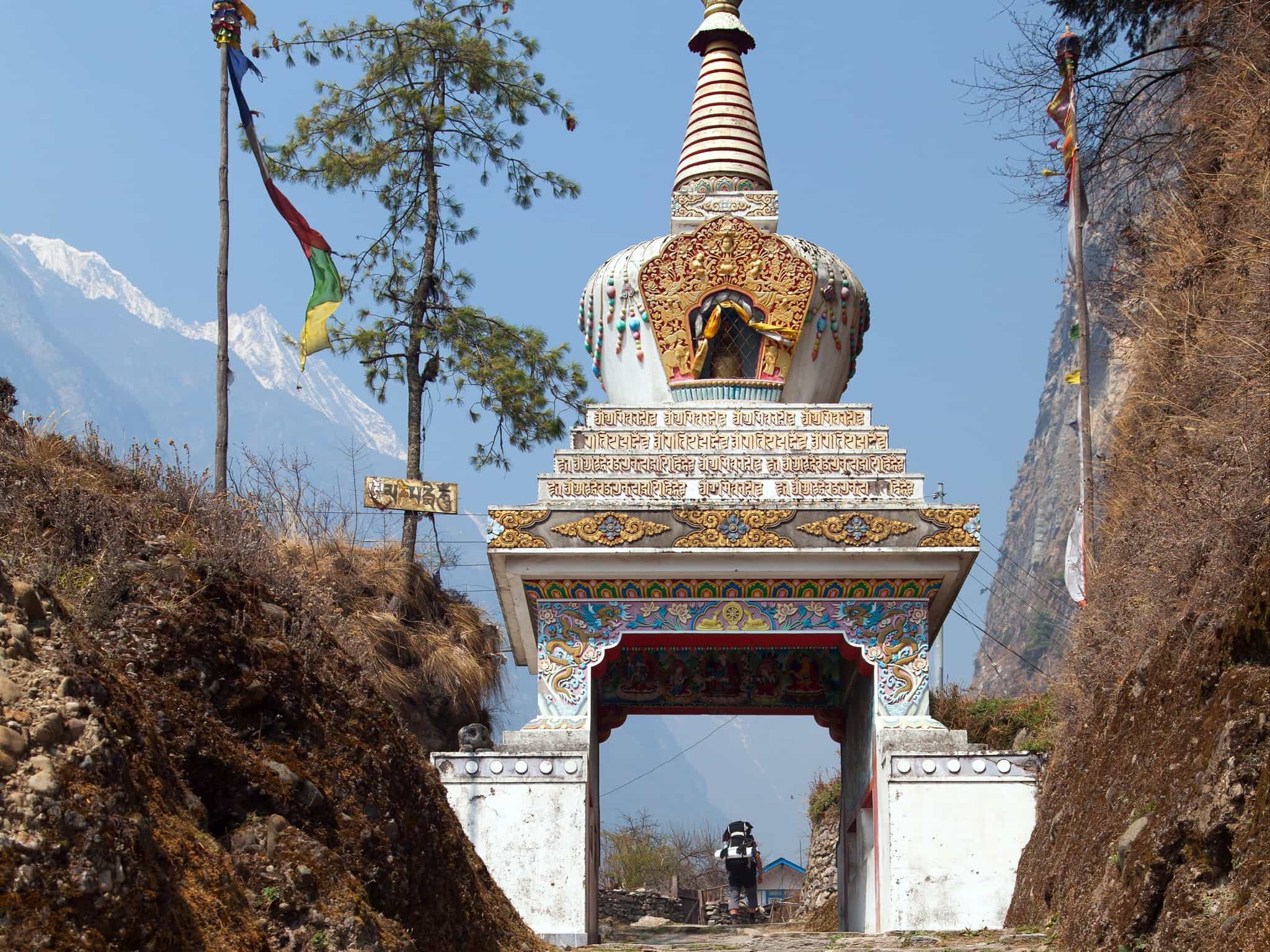
Hiking
Hike past a small waterfall and follow a steep uphill trail through a beautiful mixed forest of rhododendron and oak, gaining more than 400m elevation in a single stretch. On reaching Timang village, enjoy a well-deserved lunch and sip hot tea or coffee, while admiring the mesmerising views of Manaslu Peak from a panoramic terrace. Hit the trail again and ascend gently, passing the beautiful villages of Thanchok and Koto and finally reach Chame (2670m), your base for tonight.
Day 5
Chame to Upper Pisang
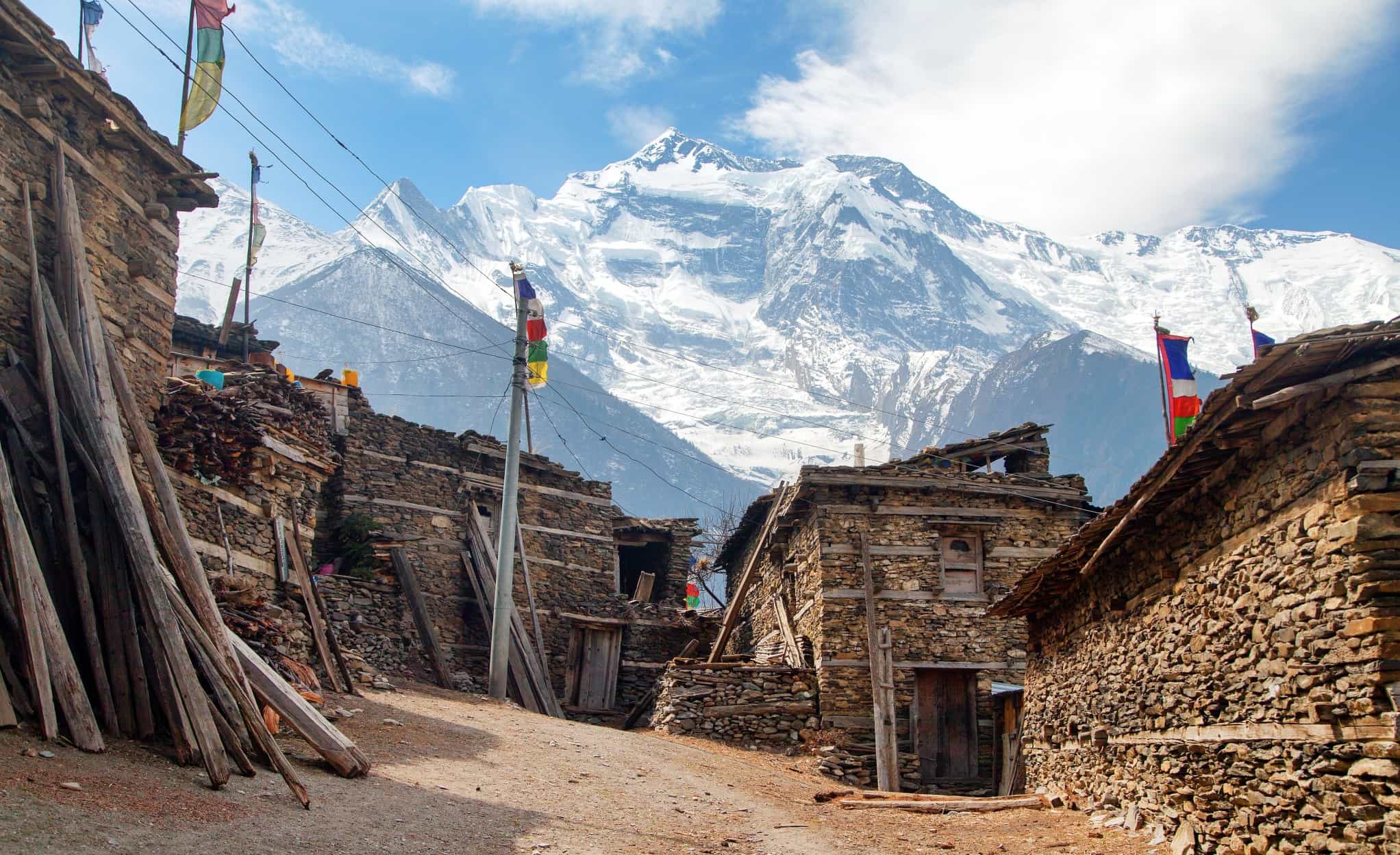
Hiking
Things get serious today, as you'll climb above 3000m. Cross the Marshyangdi River and walk past a chorten (shrine), then hike an undulating forest trail to Bhratang. A beautiful waterfall appears on the other side of the mountain as you change direction. Cross the river once again, and ascend to Dhikur Pokhari for lunch. To your right stands Swargadwari, a huge bare rock formation which is believed to be the path to Swarga (heaven). As you trek on, the valley becomes wide and vegetation sparse. End the day in the small village of Pisang at 3300m.
Day 6
Upper Pisang to Manang

Hiking
Set off hiking through a lush zone of yak pastures and crop fields, stopping for photos at a remote Tibetan monastery. Ascend on a winding path to the remote village of Ghyaru. From here onwards, the trail rolls through arid landscapes all the way to Ngawal. Stop for lunch, then continue on to Manang (3540m), one of the largest villages on the circuit. Be sure to listen out for the local Manangi language, unwritten and dangerously close to extinction.
Day 7
Acclimatisation day
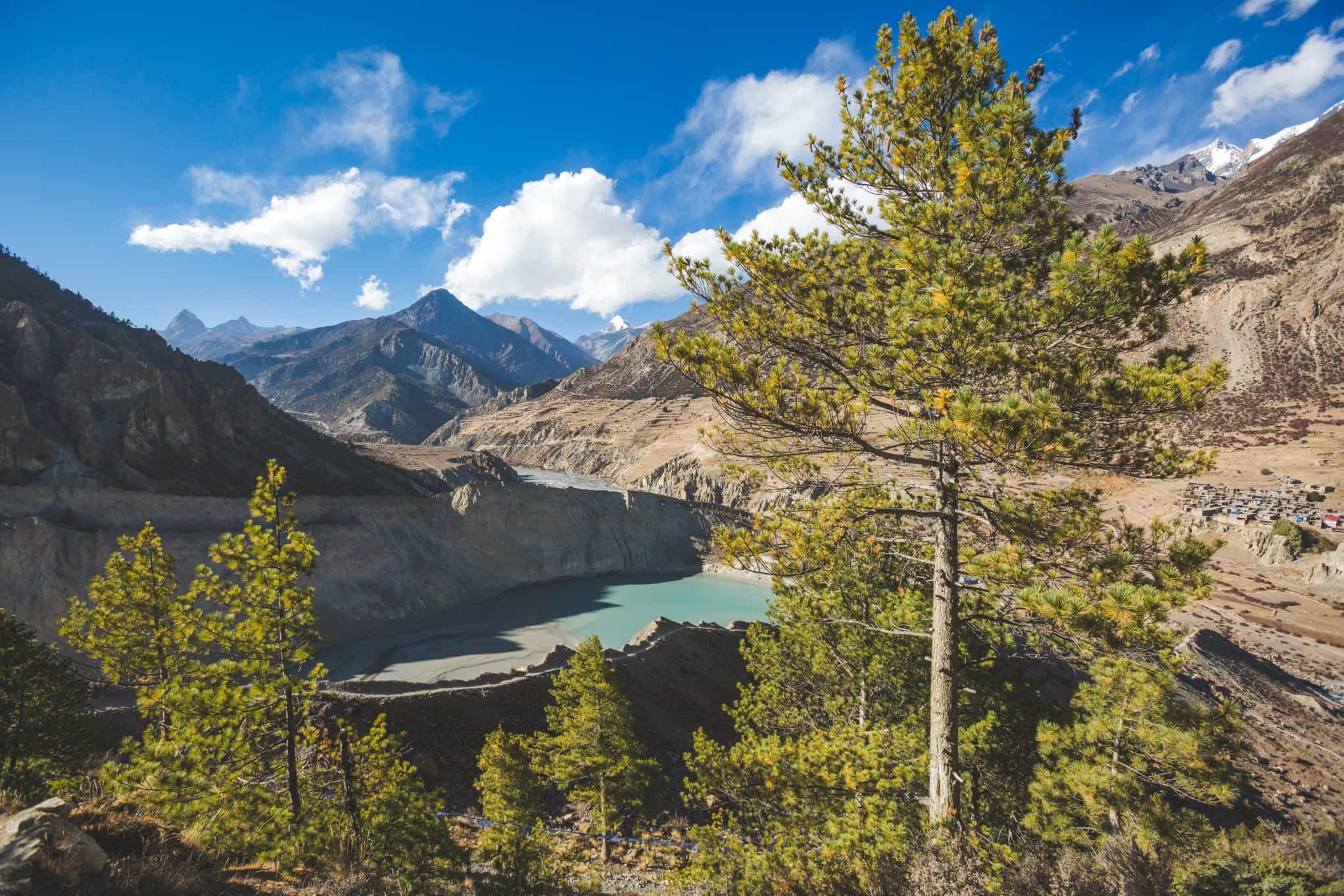
Spend the day acclimatising to the altitude. Enjoy a cup of smoky chai in Manangi town and take a leisurely walk through the old alleys, exploring the traditional stone-thatched houses with intricate wooden windows and prayer flags flapping in the air. If you are feeling energetic, take an optional walk to Gangapurna Lake, or visit the Himalayan Rescue Association post to see how they're saving lives across some of the most challenging terrain in the world.
Day 8
Manang to Sri Kharka
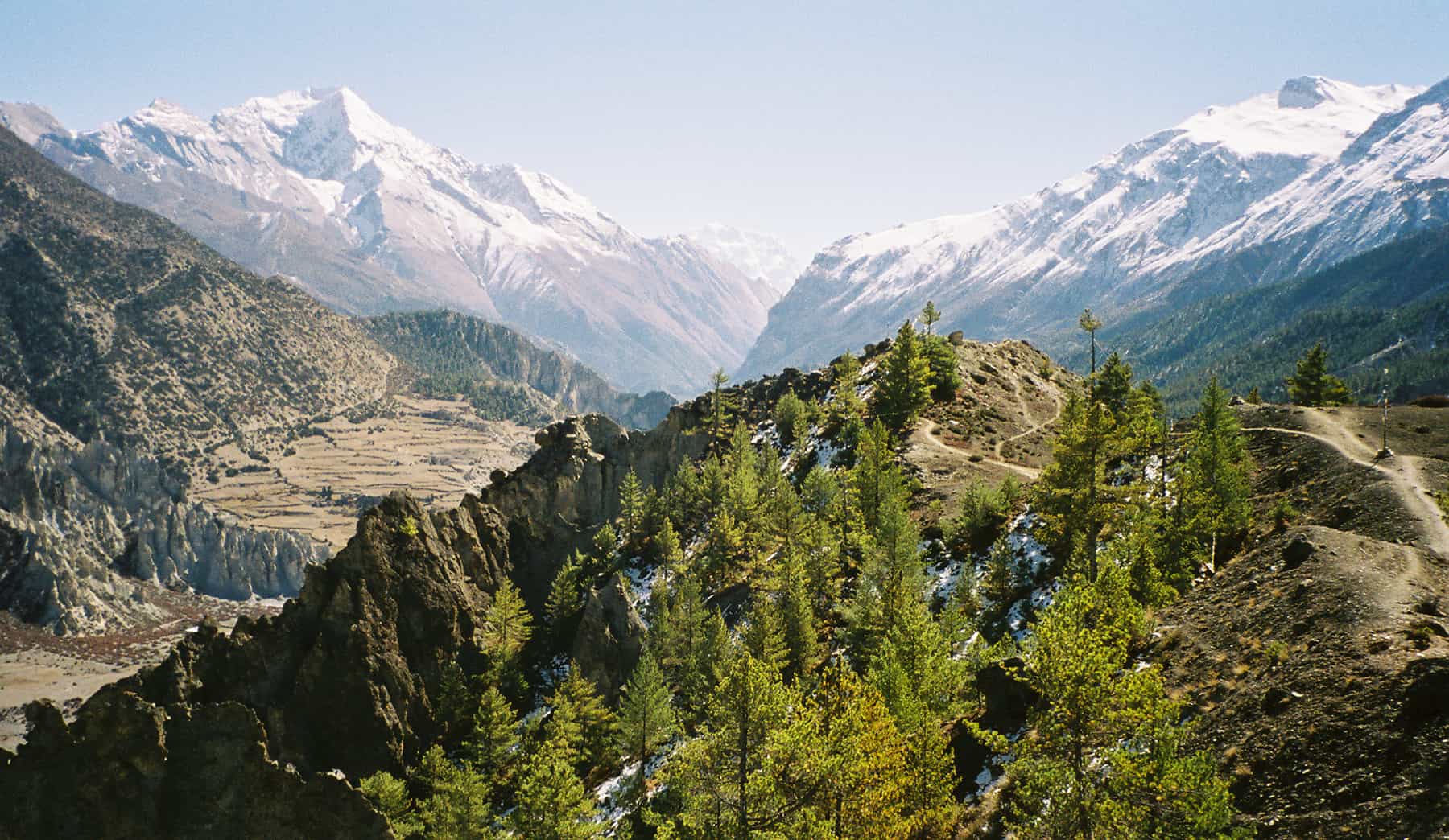
Hiking
Today you'll hike along a rarely used and completely idyllic stretch of trail as you climb to Sri Kharka. Start off hiking through barley and buckwheat fields and across Thorang Khola River via a suspension bridge. Continue with a gentle ascent on a wide trail through juniper forest and meadows to Khangsar, the last village in the area. You will notice the effect of the low oxygen level in your body while climbing, but a slow gradual ascent will make the going manageable. Reach Sri Kharka (3880m), tuck into a well-deserved hot meal and enjoy the serenity of the mountains as you prepare to see one of the great wonders of the world tomorrow.
Day 9
Tilicho Base Camp
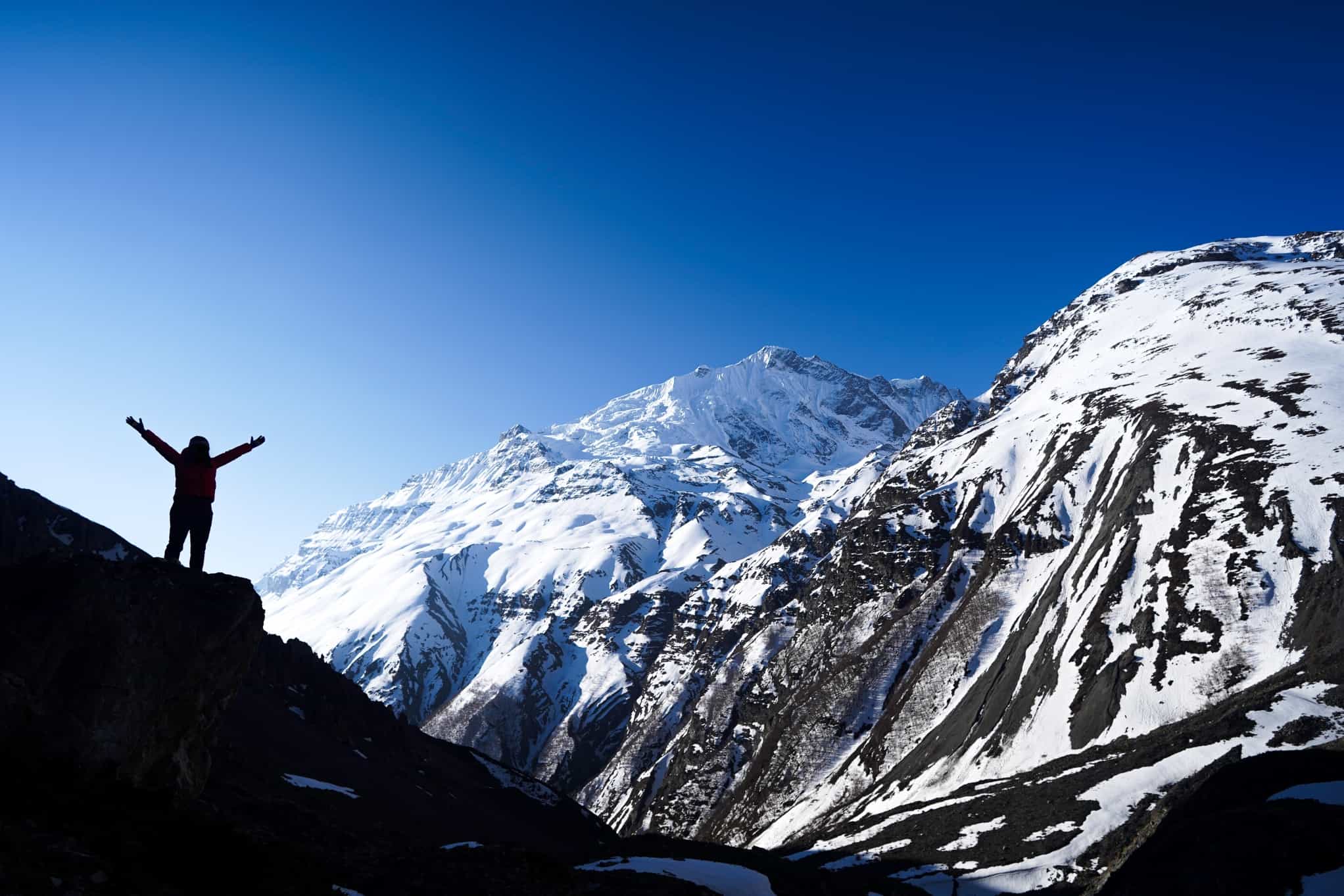
Hiking
Follow trail alongside the stunning views of Annapurna II and Gangapurna, crossing a couple of streams en route using high suspension bridges that will pump up the adrenaline. Tackle an exposed rocky slope to reach Tilicho Base Camp at 4150m. Rest up for the afternoon, then enjoy a high-altitude night sky chock full of stars. Please note, it's possible that the trail to base camp may be closed or disrupted during winter (January to March), and sometimes even in the peak season. Your guide will decide whether to continue or skip this section, based on the local weather conditions.
Day 10
Tilicho Lake
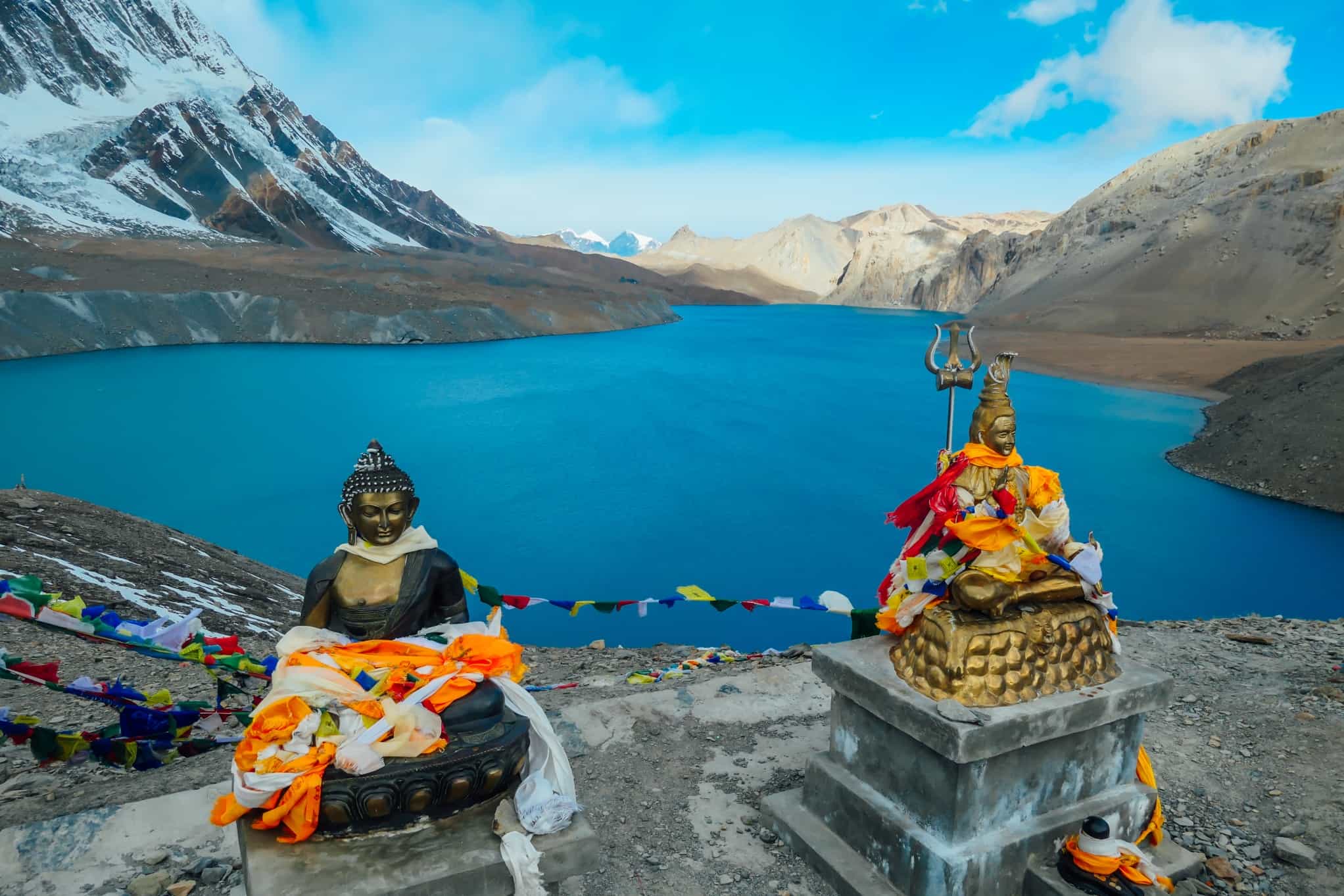
Hiking
Wake up early today and get your head torch on, to start hiking along a trail that gently climbs up the hillside. Tackle a steep ascent to reach the pass, from where the trail levels up all the way Tilicho Lake (4919m). Take time to explore one of the highest and most beautiful lakes in the world. Hike back to Base Camp for breakfast, and when you're ready, hike back down to Siri Kharka (3880m) to relax in your teahouse – you’ve earned it.
Day 11
The trail to Yak Kharka
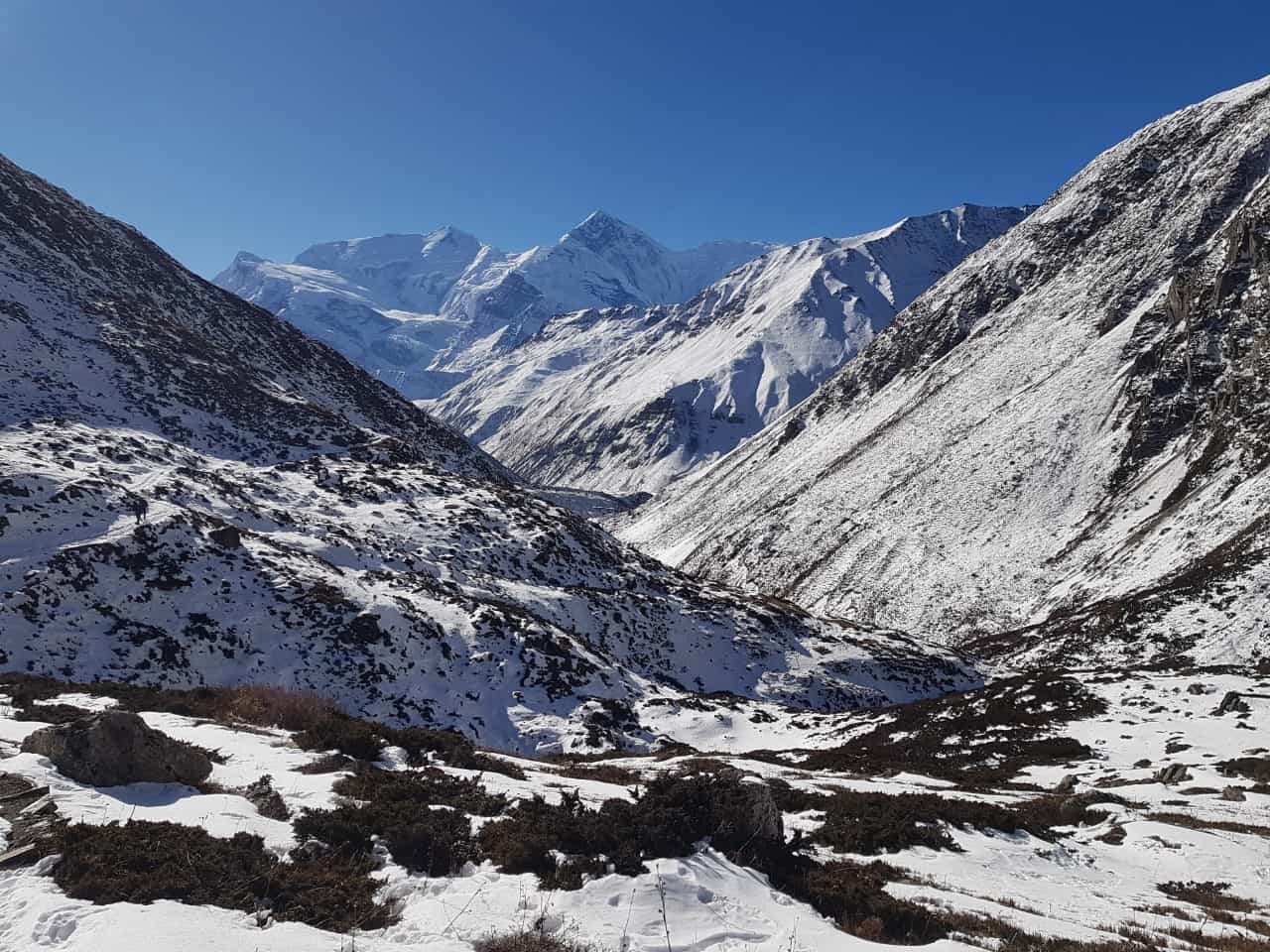
Hiking
Ascend gently to Old Khangsar, overlooking the new Khangsar village. See the ruins of the abandoned settlement with a stunning backdrop of towering peaks and the Manang Valley. Climb up gently past pastures and herds, eyes peeled for mighty yaks. As the trail reaches the ridgeline, descend to the Thorang Khola River and join the Annapurna Circuit route again, following the trail as it winds through some truly awesome scenery on the way to tonight's destination, the village of Yak Kharka (4050m).
Day 12
Prelude to the big one
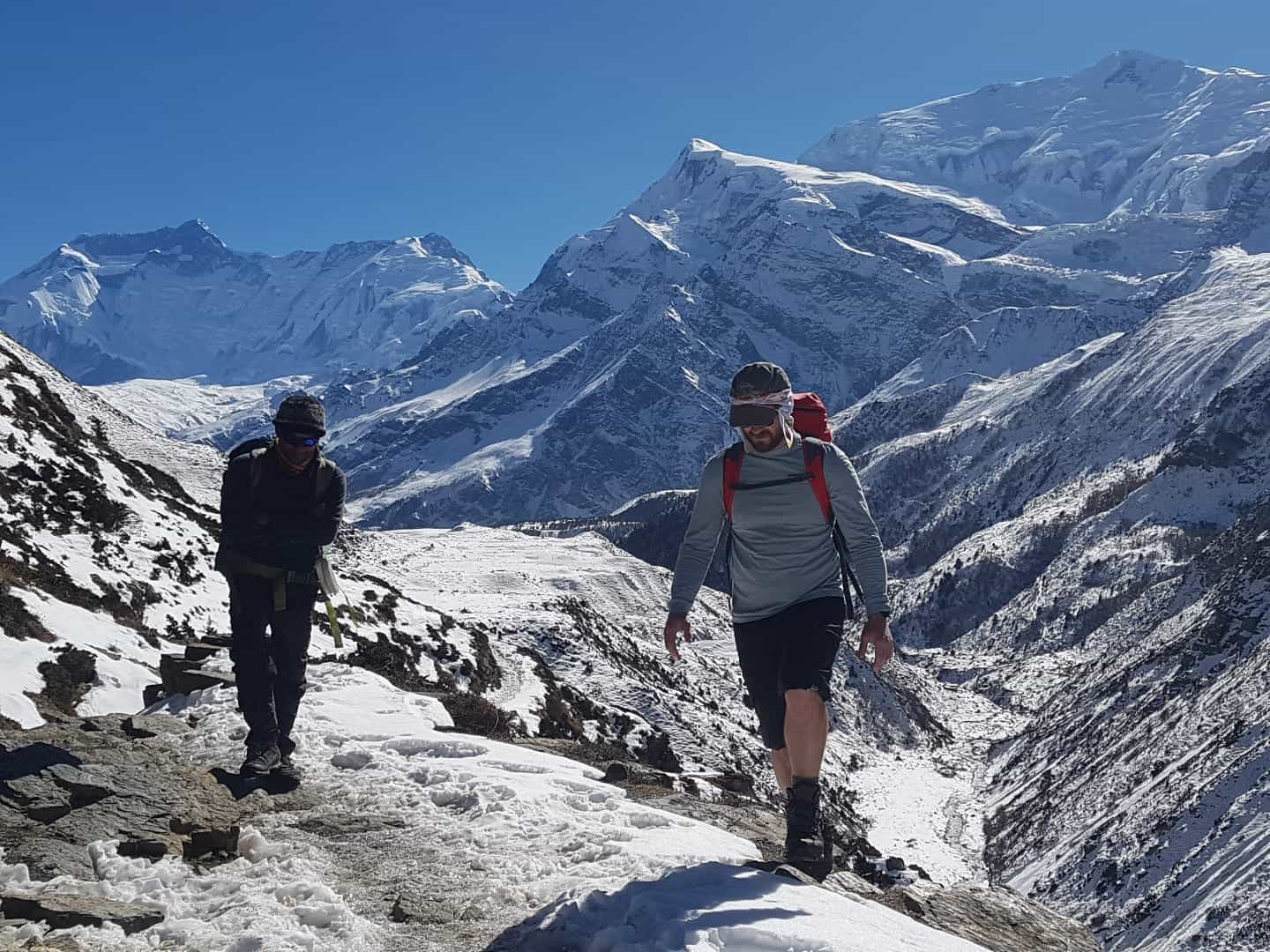
Hiking
The trail to Thorang Phedi is similar to the one you've walked a few days back – however, due to the altitude, you may notice the pace is slower and the air much thinner. Ascend gently, passing by Ledar village along a narrow and dry path, then cross the Thorang Khola River to reach Thorang Phedi Base Camp (4450m) early afternoon. Rest up for a big day tomorrow – you’ll need it.
Day 13
To Muktinath via the Thorong La pass

Hiking
The big one! Start the day around 04:00 am and navigate a steep uphill stretch to Thorong High Camp, the last settlement before the highest point of this trek. Cross the Thorang Khola River one final time and continue with a gradual but steady ascent all the way to Thorong La (5416m), the highest navigable pass in the world. Take a moment to celebrate your epic achievement as you soak in some of the best views of the whole circuit, including the high desert mountains along the Kaligandaki Valley – a perfect opportunity for some amazing photos. Begin your descent to Muktinath (3750m) and experience the serene Vishnu temple, holy to both Hindus and Buddhists and the perfect place to enjoy the tranquillity of the mountains.
Day 14
Descend to Jomsom
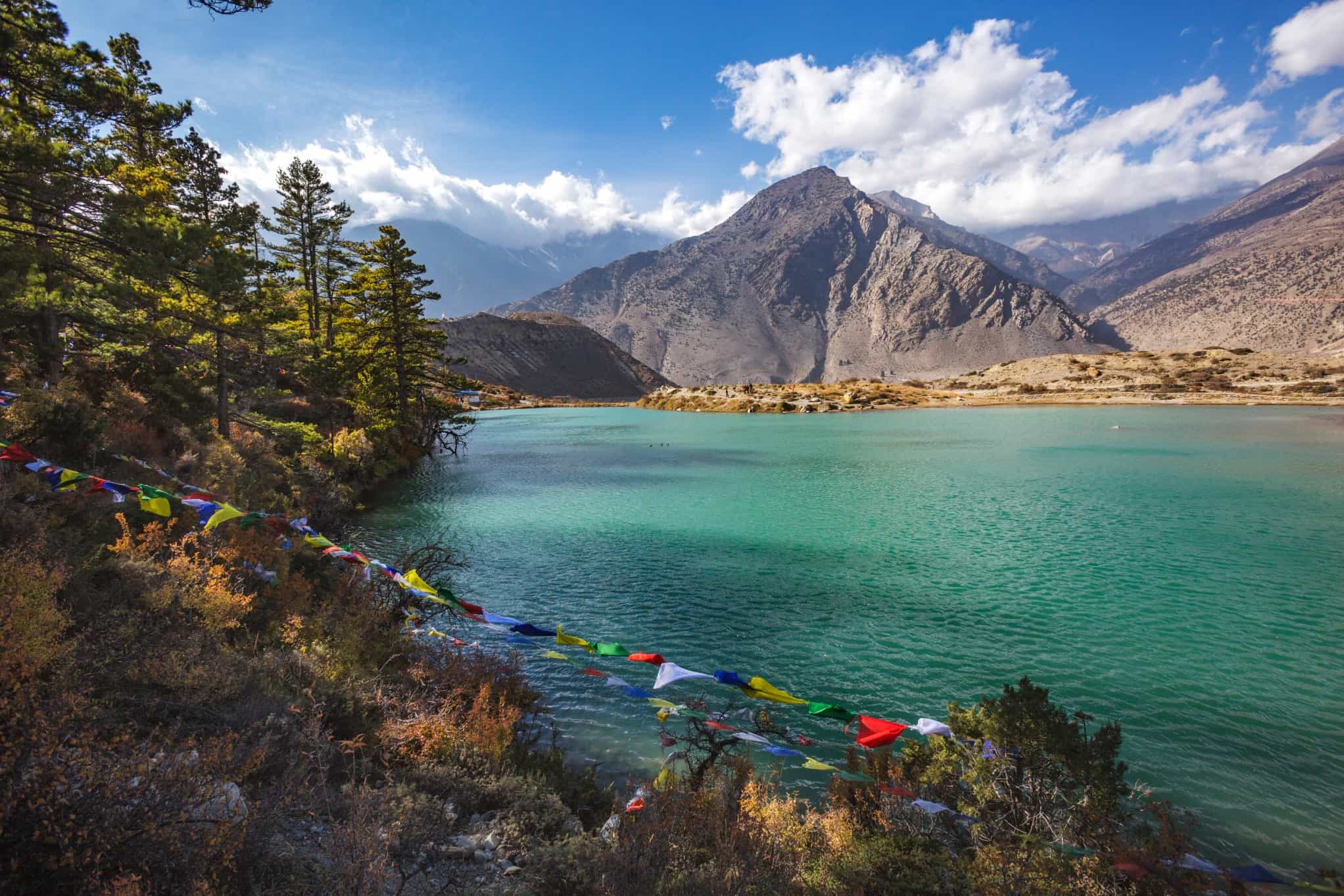
Hiking
Set off on a downhill path to Kagbeni, and follow the banks of the Kali Gandaki River as it crosses through the deepest canyon on earth. Take in the magnificent views of Mount Annapurna and Dhaulagiri and then spend the night at a teahouse in Jomsom, gateway to an ancient trade route that once spanned the Himalayas.
Day 15
Fly to Pokhara
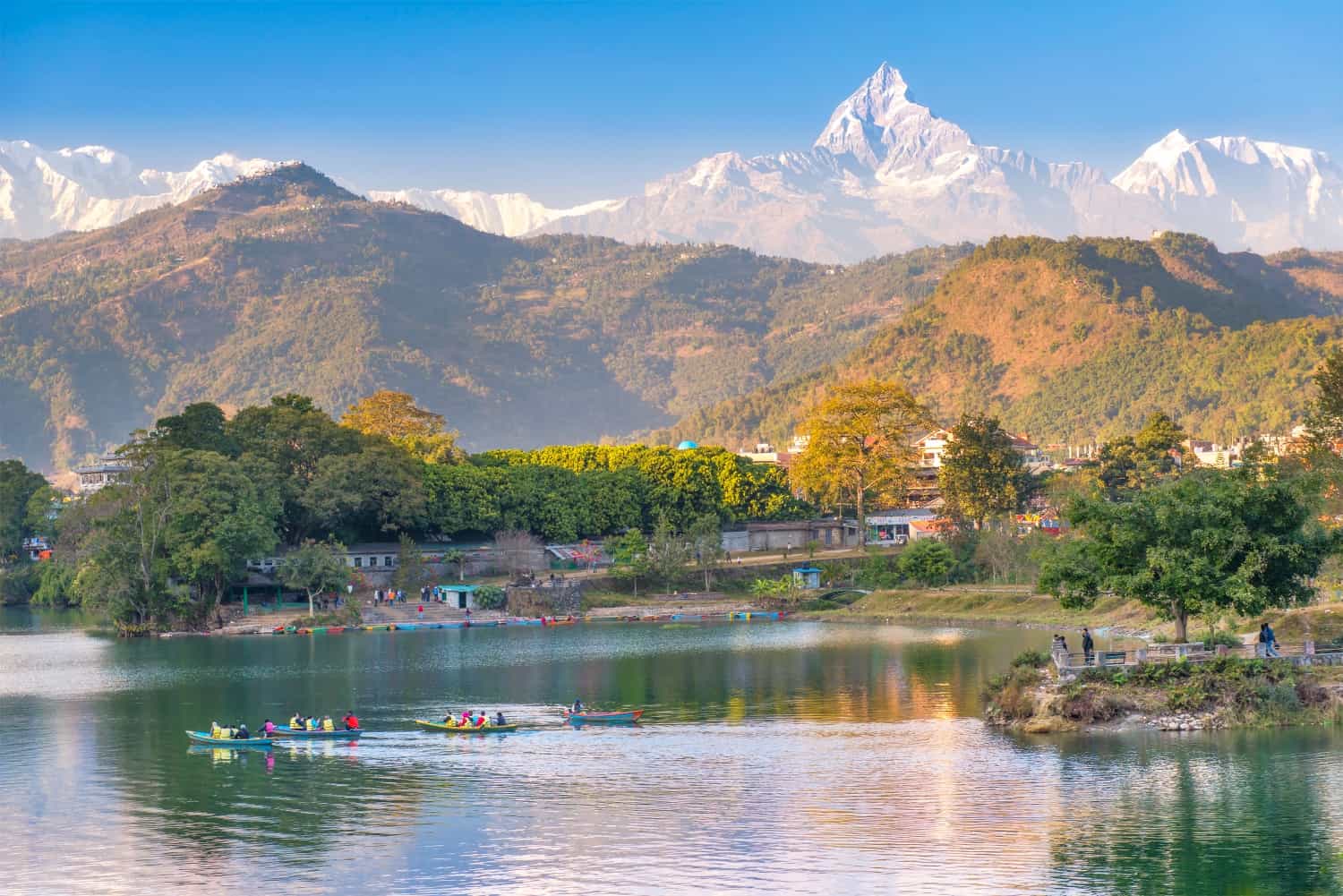
Fly over the Himalayas to the lakeside town of Pokhara and check into your hotel near the lake. (Please note, flights from Jomsom don't operate over winter – so if you're travelling between mid-November and mid-February you'll drive instead, which takes approximately 7-8 hours). Time permitting, head out to explore the picturesque lakeside promenade. Celebrate the end of the epic Annapurna Circuit trek with your group in one of the cosy waterfront bars or restaurants – you've earned it!
Day 16
Return to Kathmandu
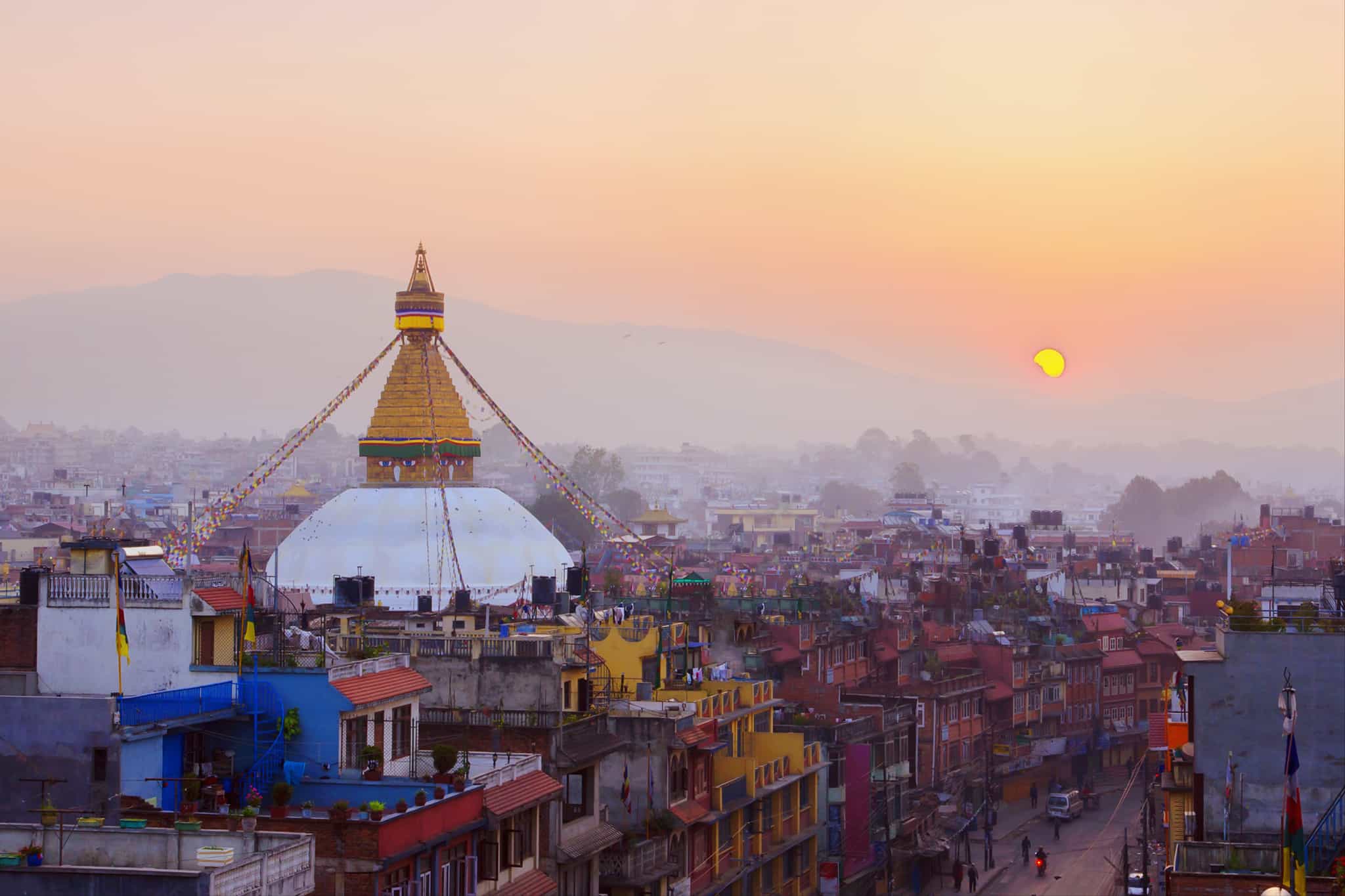
Driving
Rise early and take a bus through the mountains and back to Kathmandu (approximately 7-8 hours, depending on traffic). Spend some free time exploring the city.
Day 17
Your final day in Nepal
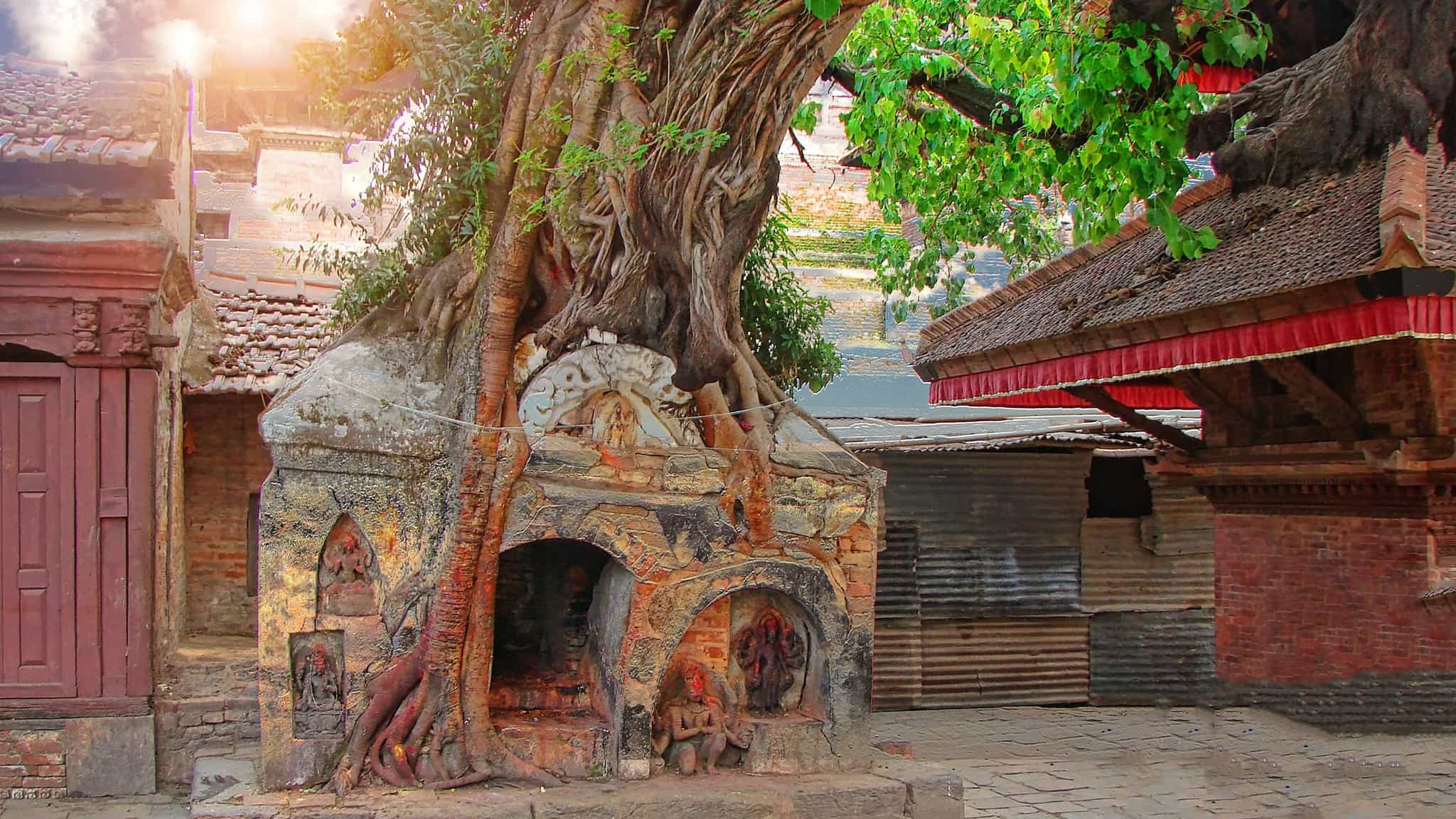
Enjoy a lie in, then explore the city some more. Visit a holy Hindu temple or one of the largest Buddhist stupas in the world, before heading for the airport and back to reality.
Day 1
Breakfast
Lunch
Dinner
Day 2
Breakfast
Lunch
Dinner
Day 3 – Day 14
Breakfast
Lunch
Dinner
Day 15
Breakfast
Lunch
Dinner
Day 16
Breakfast
Lunch
Dinner
Day 17
Breakfast
Lunch
Dinner
What is the food like?
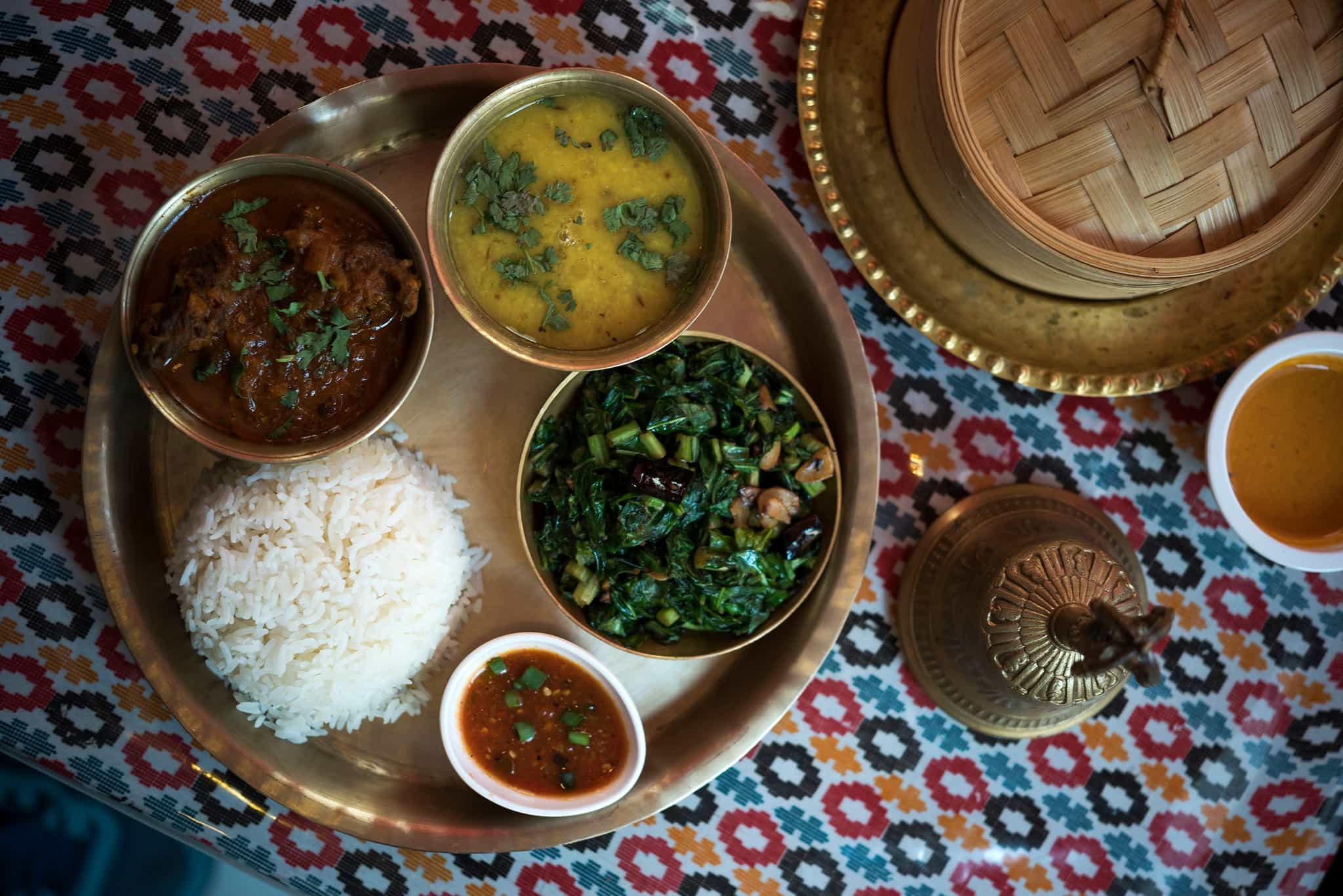
Breakfast is usually either hot porridge, muesli or Tibetan bread served with an omelette or boiled eggs. The menus in the teahouses are very similar at every stop and there will usually be a choice of traditional Nepalese dhal bhat (a mixed plate of lentils, rice, vegetables and pickles – delicious and healthy!), momos (Nepalese dumplings), mixed noodles, pasta and even pizza. Although meat is available at some teahouses, we suggest you ask your guide for their advice, as it tends to depend on how far it has travelled as to whether it is a safe option.
Dairy-free, vegan or vegetarian diets can be catered for while trekking although meals may get a bit repetitive – dhal bhat will likely be your go-to staple. Gluten-free/coeliac diets are tricky to cater for on teahouse treks (beware that powdered soups and seasonings used often contain gluten, and cooking oil is commonly reused and may cause cross-contamination). Please explain your dietary requirements to your guide so that they can assist when ordering, and bringing along some extra food/snacks is advisable.
What is the accommodation like?
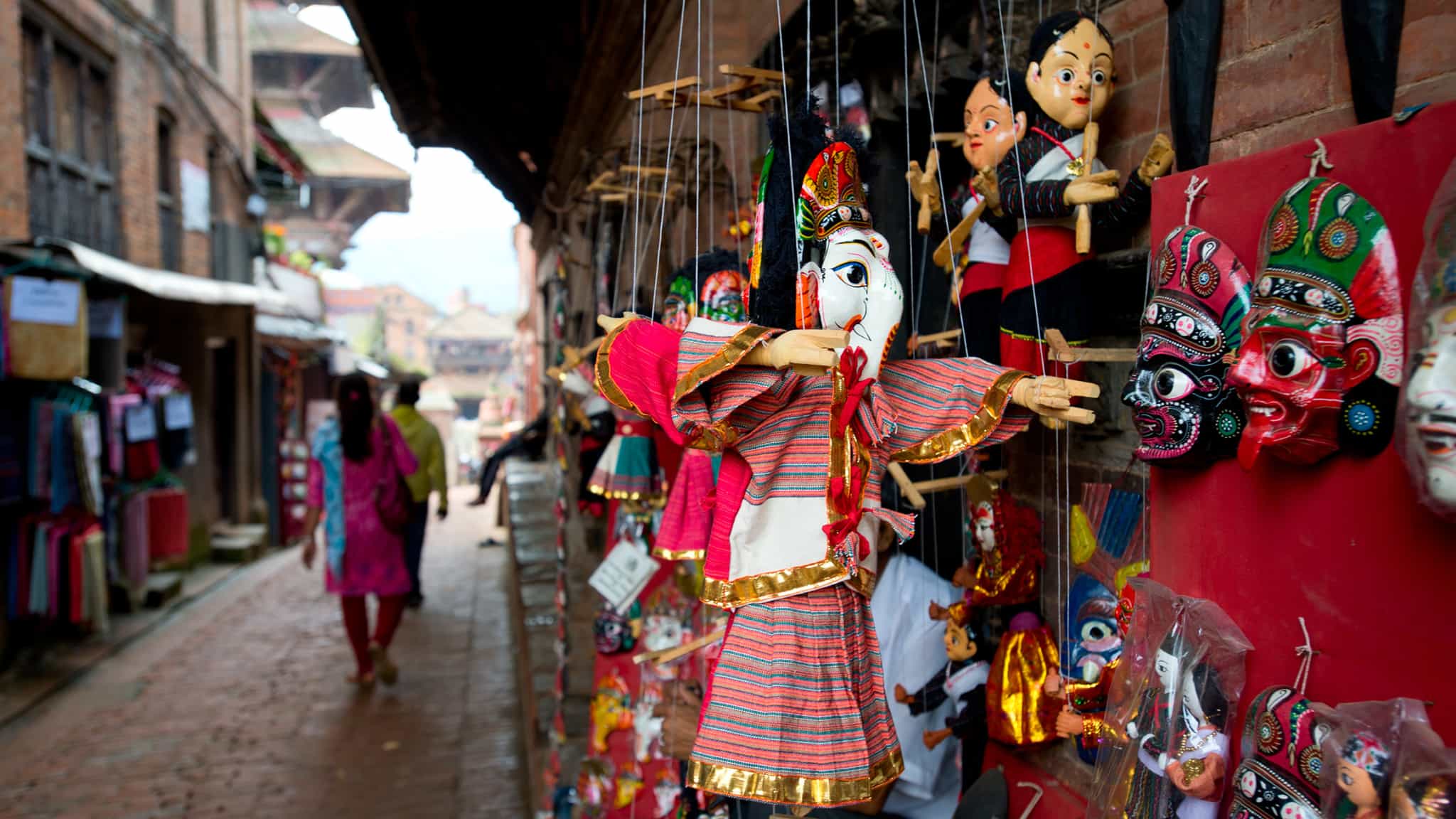
Kathmandu
On your first and last nights, you’ll stay in a centrally located tourist hotel in Kathmandu's Thamel area on a twin-share basis, with en-suite bathrooms, air-con and WiFi. The hotel is located in the heart of Thamel, close to the main shopping area and the heritage sites.
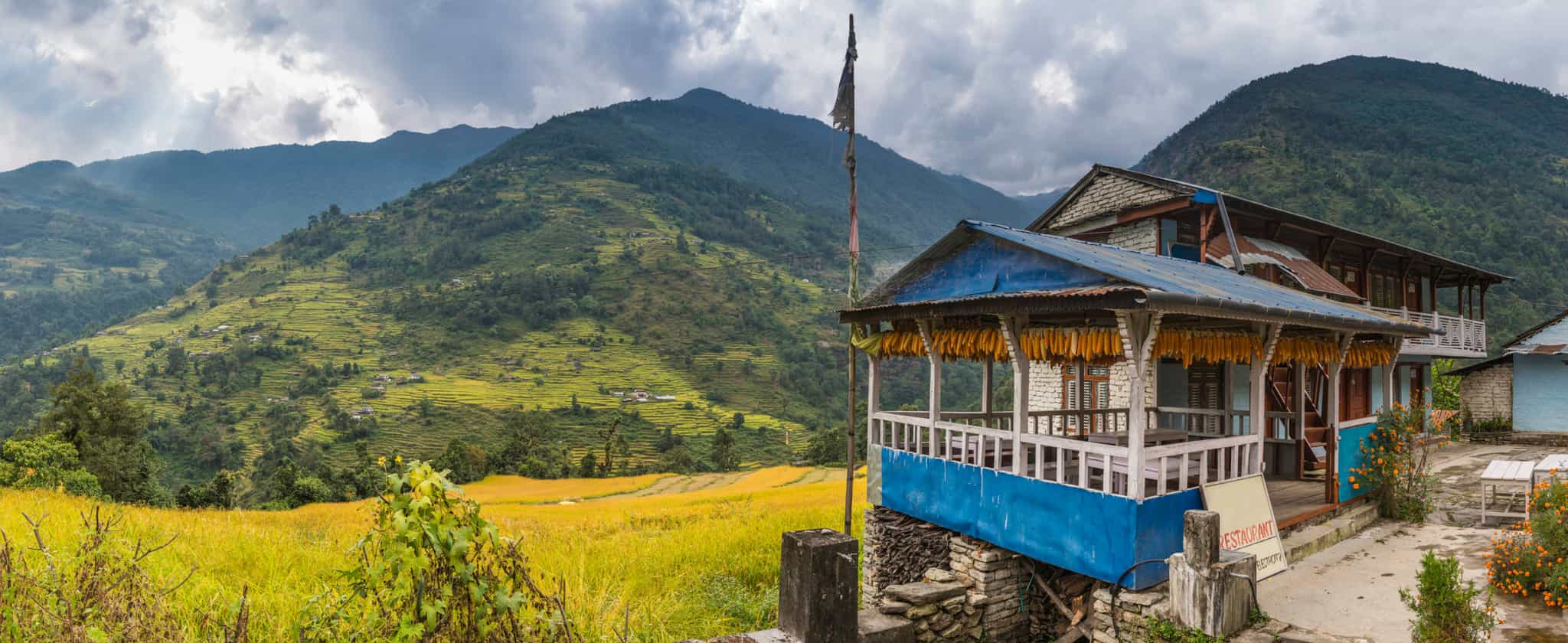
Annapurna Circuit
During the trek you'll stay in traditional teahouses – these are mountain lodges that tend to have a communal dining area and basic toilets. Rooms are usually sorted by gender and many offer hot showers or phone charging for a small fee. There’s no heating, so your warm sleeping bag is needed.

Pokhara
On your night in Pokhara you'll stay in a hotel near the lake, close enough to all the action but still in a quiet spot.
Upgrades
For solo travellers looking for their own space, an optional private room can be booked for an extra charge, see Optional Extras for the price. This is only applicable to the nights spent in hotels and is subject to availability. Please request this at the time of booking.
This trip has been rated as Challenging
Much of this trek is within the capabilities of people with good fitness who are keen trekkers. Still, it is important to note that trekking at altitudes above 3000m/10,000ft is more demanding on the body than walking at low elevations.
Some training beforehand will help and we advise doing at least one weekend of back to back days walking. The guide will set the pace and as with all altitude treks, the theme is ‘slowly slowly’ to help you adjust to the altitude.
What will I need to carry?
This trip includes one porter for every two trekkers. They will carry up to 20-25kg of kit so your overnight bags and spare clothes will be transported for you (maximum 12kg per person). You will only need to carry a daypack with essentials in (extra layer, snacks, water, suncream, camera etc).
There are 3 different seasons for trekking in Nepal:
Winter (Dec-Feb): Despite being seen as ‘off-season’ this is often the best time to trek in Nepal. The nights can be very cold (down to -20ºC) but the trails are quieter and the mountain views are often at their best due to the clear sunny skies.
Pre-Monsoon/Spring (Mar-May): Temperatures rise significantly in spring and flowers are in full bloom in the lower areas. Although it can still drop below freezing at night, the daytime temperatures tend to sit between 10-15ºC.
Post-Monsoon/Autumn (Sep-Nov): This is the most popular time to trek in Nepal with generally sunny and mild days. It can get cold and windy at higher altitudes, however the skies are usually clear.
Of course, mountain weather is notoriously hard to predict and snow can be expected on any trip so come prepared.
As the Annapurna Circuit has wide trails, and much of it sits in a rain shadow, the summer months of June-August are still good for trekking. These months are a great time to have the trails almost entirely to yourself.
The Area
Logistics
Starts
Tribhuvan International Airport, Kathmandu
Arrive by 16:00 on Day 1
Ends
Tribhuvan International Airport, Kathmandu
Any time on Day 17
Transfers
Airport arrival and departure transfers are included no matter when you arrive and depart (even if you book extra nights before or after the trip), provided you have completed your passenger information form and have supplied your flight details in advance. On Day 1, your tour leader will arrange a group briefing before a welcome dinner, so we strongly encourage you to book a flight landing by 16:00 in order to be able to join this on time.
Travel options
There are regular flights to Kathmandu from major airports across the UK and Europe.
Enjoy 12.5% Off Outdoor Gear
In need of a few more items? All bookings receive a 12.5% discount to use at Cotswold Outdoor, Snow + Rock and Runner's Need.
What do I need to bring?
- Day pack with rain cover (30 litre +)
- Duffle bag (for the porters to carry your overnight kit)
Clothes
- Waterproof jacket with hood
- Mid-weight down jacket
- Waterproof trousers
- Lightweight trekking trousers
- Hiking shorts (if trekking in the summer)
- Thermals (top and bottom, merino ideal)
- 2-3 trekking t-shirts/shirts
- Fleece or warm mid-layer
- Waterproof thick gloves
- Glove liners
- Hiking socks and lighter walking socks
- Wool hat
- Sun hat
- Spare underwear
- Buff or similar
Shoes
- Worn in waterproof hiking boots
- Lightweight trainers (for the evenings)
- Flip-flops or sandals
Sleeping
- 4-season sleeping bag
- Sleeping bag liner
- Pillow case (optional)
Other
- Trekking poles
- Travel towel
- Sun protection (sunscreen, sunglasses)
- 2 water bottles (1 litre each)
- Metal SIGG bottle (useful to fill with hot water to use as a hot water bottle at bedtime)
- Headtorch
- First aid kit and/or personal medication
- Water purification tablets/system
- Hand gel
- Biodegradable wet wipes
- Small biodegradable bags to take toilet tissue off the mountain
- Toilet paper/tissues
- 1 x passport photo for trek permit
- Powerbank
- Universal plug adaptor
- Book/kindle/cards for downtime
Winter departures only (end Nov until Mar)
- Gaiters
- Microspikes
- Extra warm layers (add an extra warm item to all key items above)
- Extra set of thermals (pair to walk in, pair to sleep in)
- Merino trekking socks
- Merino glove liners
This winter kit can sometimes be necessary even in the high season, depending on weather conditions. Your local host will contact you a week prior departure to let you know if any extra items are necessary. If you are unable to get them on time, you can also buy these items locally (see below).
What's available to hire?
The below can be rented in Kathmandu:
- Down jacket: costs approx. $1.5/day with a deposit of $50
- Sleeping bag (3-season only available): costs approx. $2/day with a deposit of $80
- Spikes (for winter departures only) costs approx. $1.5/day.
(Please ask your host if this is needed so they can assist you with how to arrange the hire.)
What can you buy in Kathmandu?
Kathmandu has many outdoor gear shops - some sell real kit that is the same price you will find it at home, and some are filled with cheaper imitation gear that may not be of the same quality. You will, however, find a soft duffel bag easily that the porters can carry.
Please remove all unnecessary packing before you leave home and ensure you take all plastic off the mountain to be disposed of in Kathmandu.
Optional Private Room Upgrade
Payable Before Departure
Optional Private Room Upgrade
… Per Person
Extra night in Pokhara (Single Room)
Payable Before Departure
Extra night in Pokhara (Single Room)
…
Extra night in Pokhara (Twin/Double Room)
Payable Before Departure
Extra night in Pokhara (Twin/Double Room)
…
Pre/post-trip accommodation in Kathmandu (Single)
Payable Before Departure
Pre/post-trip accommodation in Kathmandu (Single)
…
Pre/post-trip accommodation in Kathmandu (Twin/Double)
Payable Before Departure
Pre/post-trip accommodation in Kathmandu (Twin/Double)
…
The Annapurna trek was excellent
The Annapurna trek was excellent with some spectacular views - we travelled in May and, while the first few days were foggy and a bit worrying, the weather cleared up and we had some great days to follow (including a snowy pass which was a major highlight).
The walk was well paced and we never felt in any danger, so many thanks to our leader Pujan. Our assistant guide, Sebika, was outstanding and was great fun to be with during the entire circuit. Uttam, Balaram and Surya were excellent porters and were quick to help the group.
The accommodation (including showers and toilets), food, and availability of cheap/free wifi (don’t bother buying a SIM card) were all surprisingly good and there’s nothing to be worried about!
My only criticisms of the itinerary would be the walk through canyon which was unnecessary and unpleasant, and the drive from Pokhara to Kathmandu - I’d have much rather driven straight to Jomsom and flown to Kathmandu.
Brilliant well run trek
We had a fantastic time on our Annpurna Circuit Trek! The views are incredible.
Our lead guide Tika was fun and friendly but also incredibly professional and we always felt very safe in his care. Assistant guides Pasang and Tej were also wonderful. Always incredibly helpful and friendly.
Would definitely recommend Much Better Adventures and Freedom Adventures to anyone interested in doing the Annapurna Circuit!
Can't Stop Talking About This Trip!
Exceeding my expectations from start to finish, this was the trip of a lifetime that I can't stop talking about! From start to finish, this itinerary was expertly planned and managed by local operator Freedom Adventures. Kush, our lead guide, was on top of it all without ever letting us see him sweat - from smoothing over a mishap at an over-booked tea house to reorganizing departure transport due to flight cancellations - he runs a flawless show that takes 5-star care of his clients AND team. Anil and Asman were outstanding right-hand-men to Kush, bringing humor, ensuring client safety, and literally waiting on us all hand and foot day after day. And, you can expect more than just trekking through some of the most beautiful scenery on earth... we got a full education on every place we visited. Lastly, I couldn't have been happier with my trek-mates - it's evident the type of people who book through Much Better Adventures are like-minded adventurers: inspiring, independent and hilarious!
Exceptional Trip!
My husband and I completed the Annapurna Circut in May 2024 and it was a truly incredible experience that exceeded our expectations. The whole team where brilliant but a special shout out to Pujan our leader who went above and beyond to teach us about the area and Nepal as a whole. Sebika was outstanding in every way and i hope she soon becomes a leader as I couldn't fault her, she was a real delight! Balaram and Uttam were wonderful, incredibly strong and their cheery faces at every tea house were a wonderful sight to see. We had a wonderful group of other walkers and the route is awesome! Highly recommend the trip to others
Our Purpose
To protect our world's wild places, one adventure at a time.
Positive impact adventure travel

